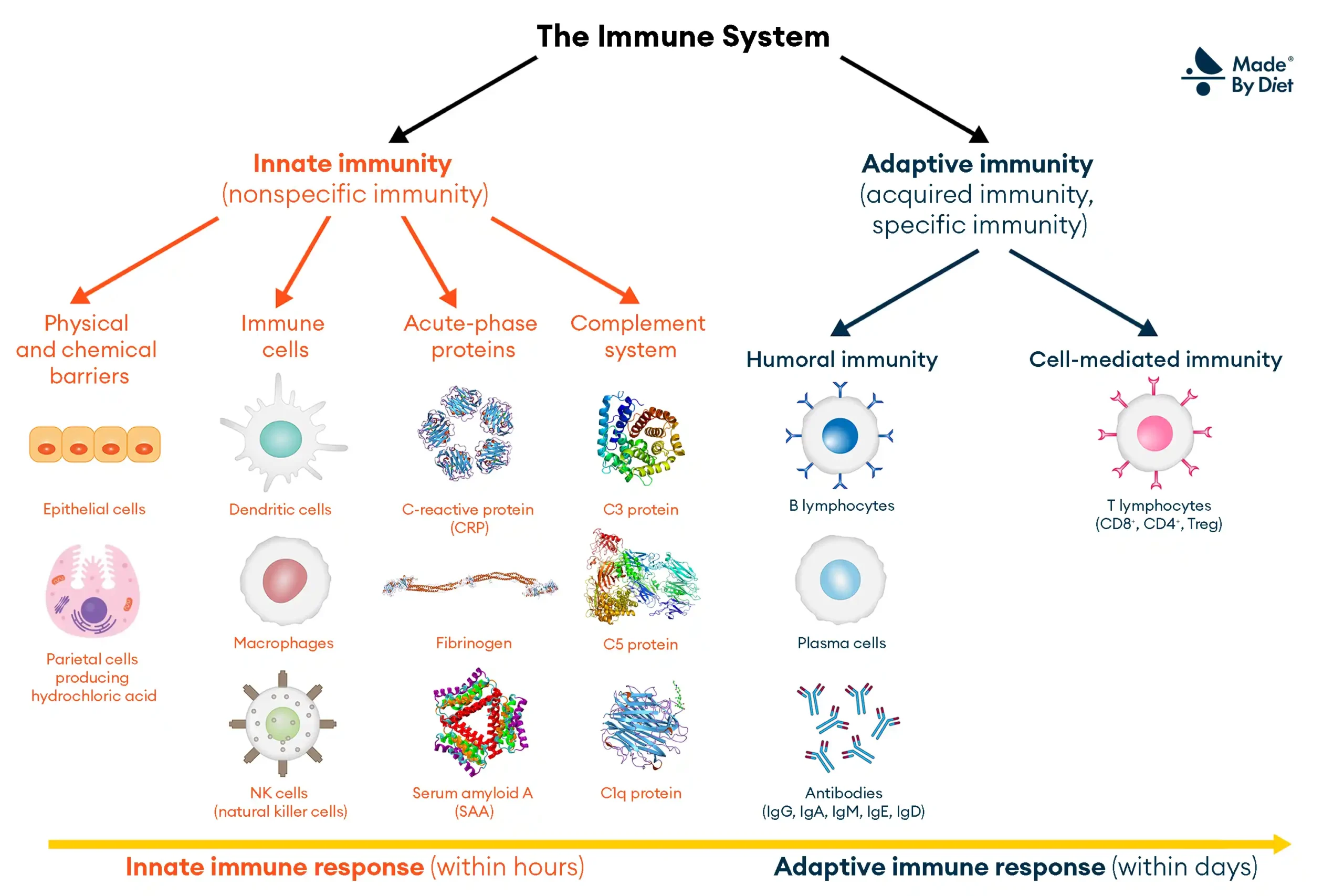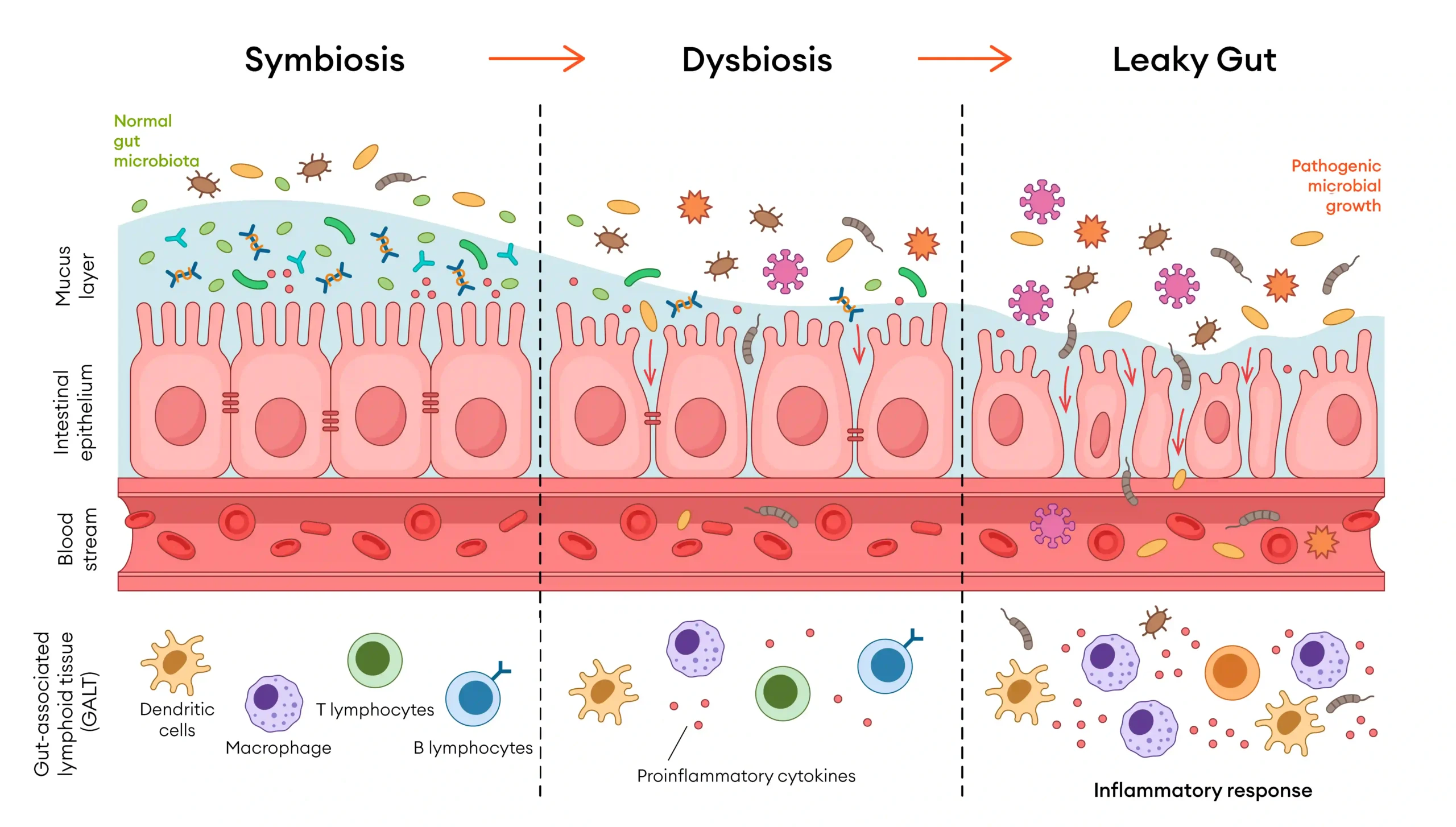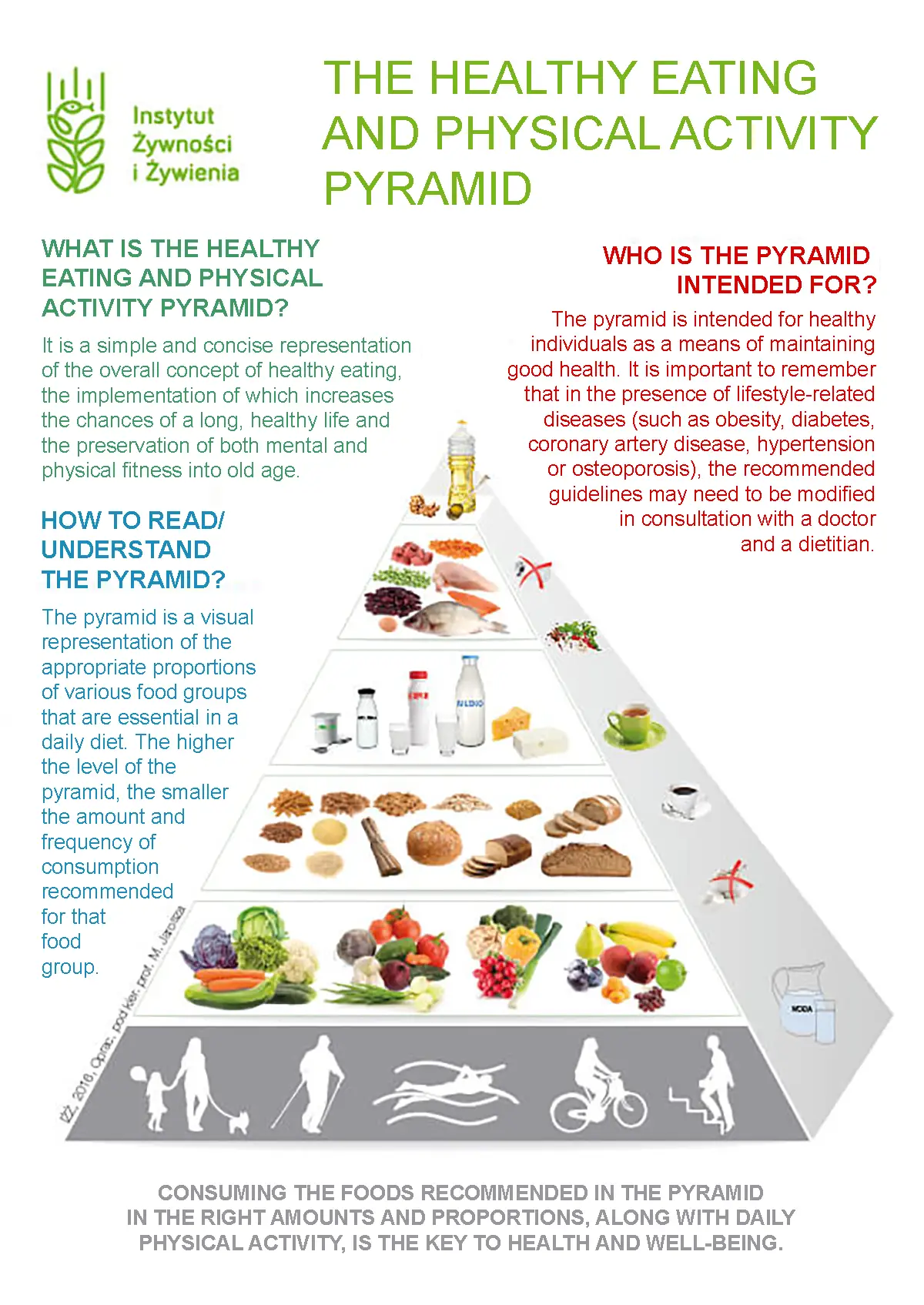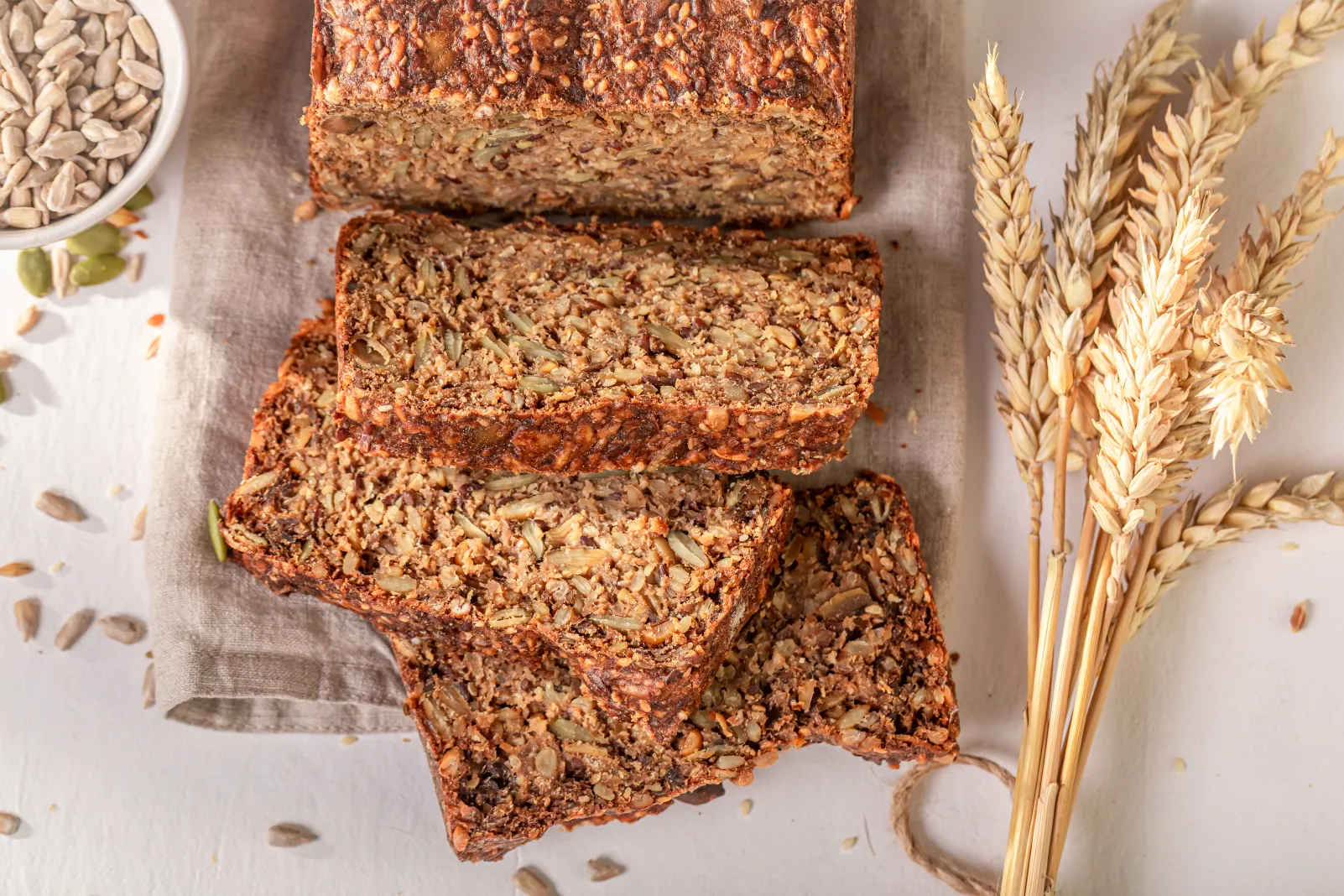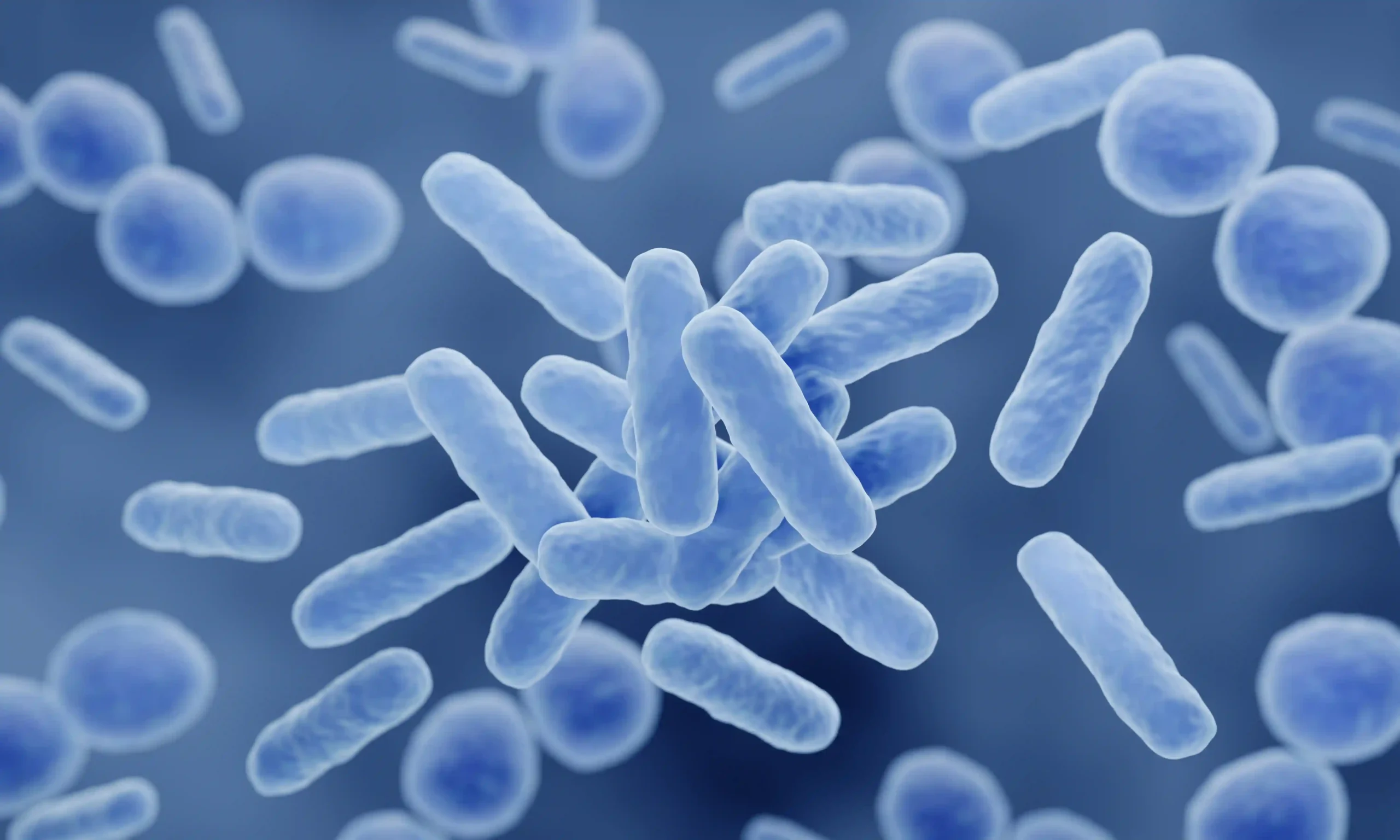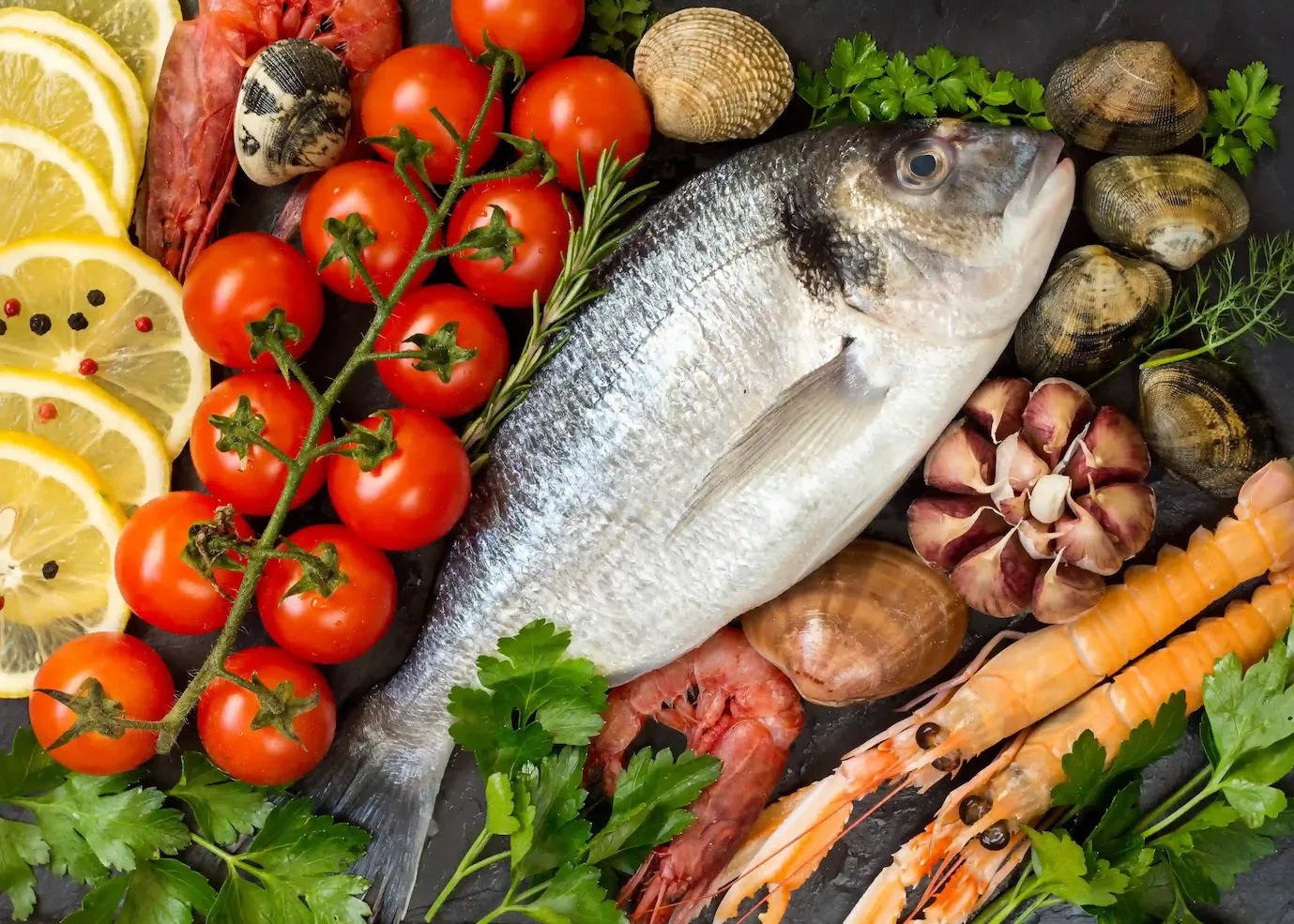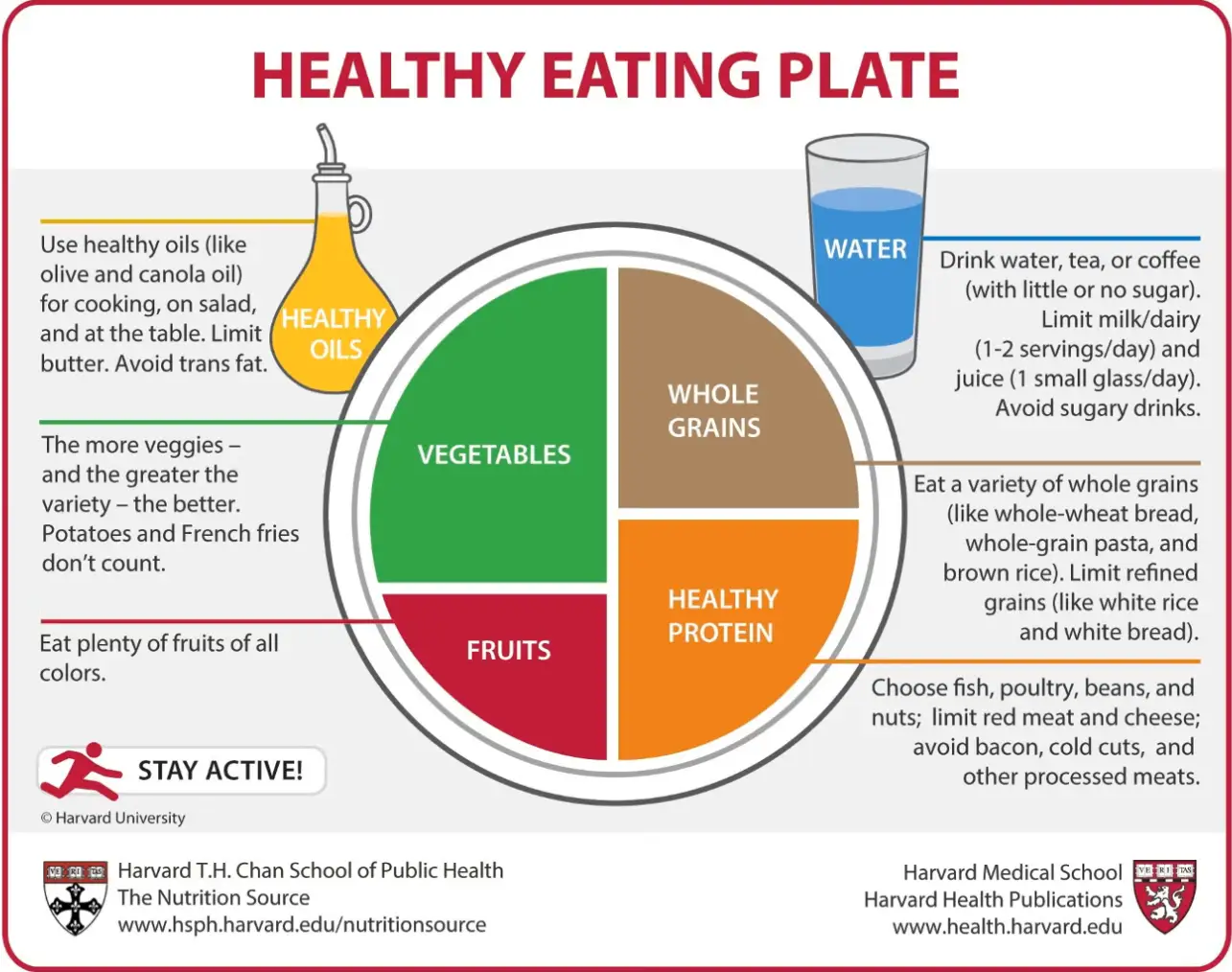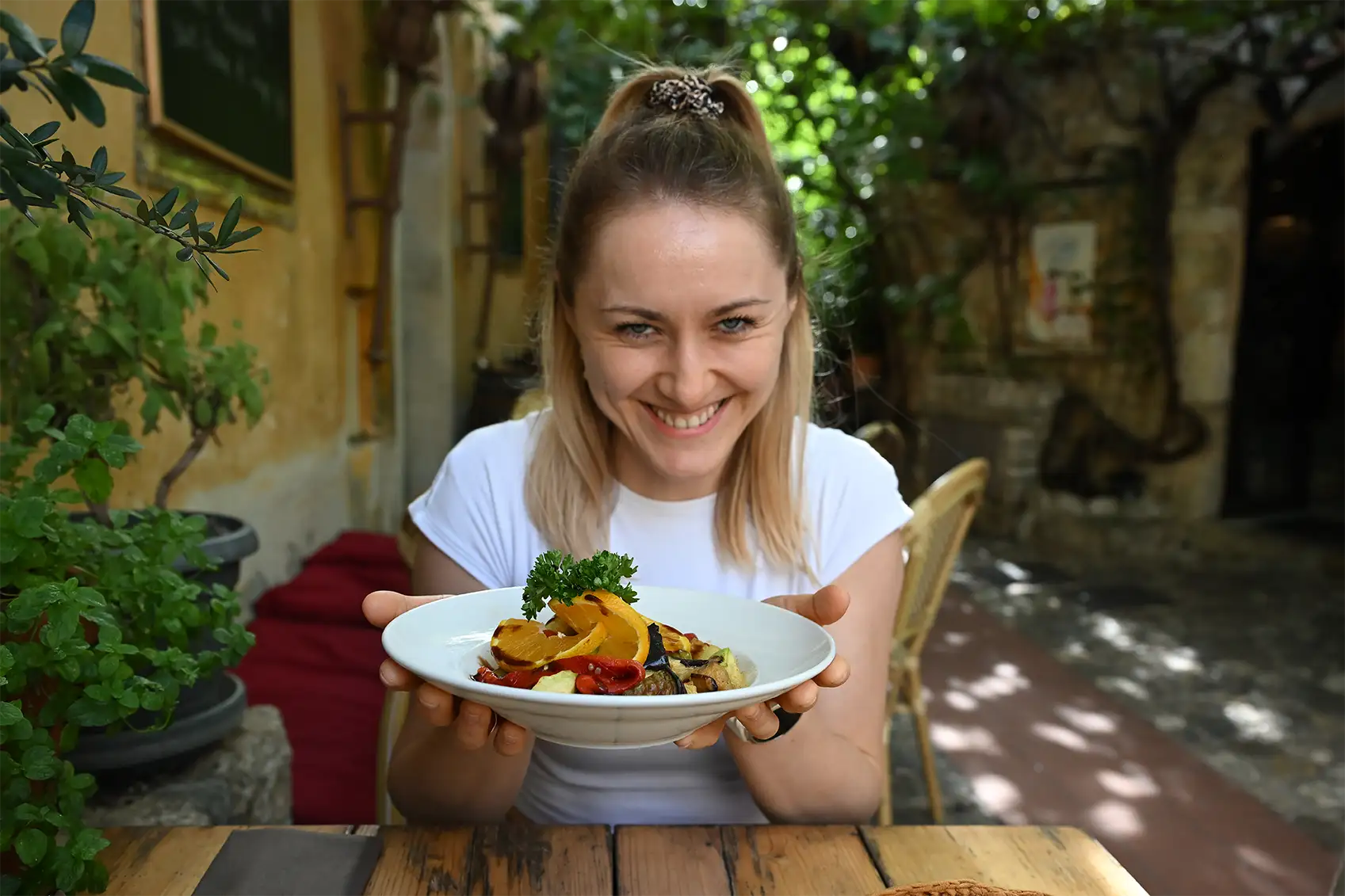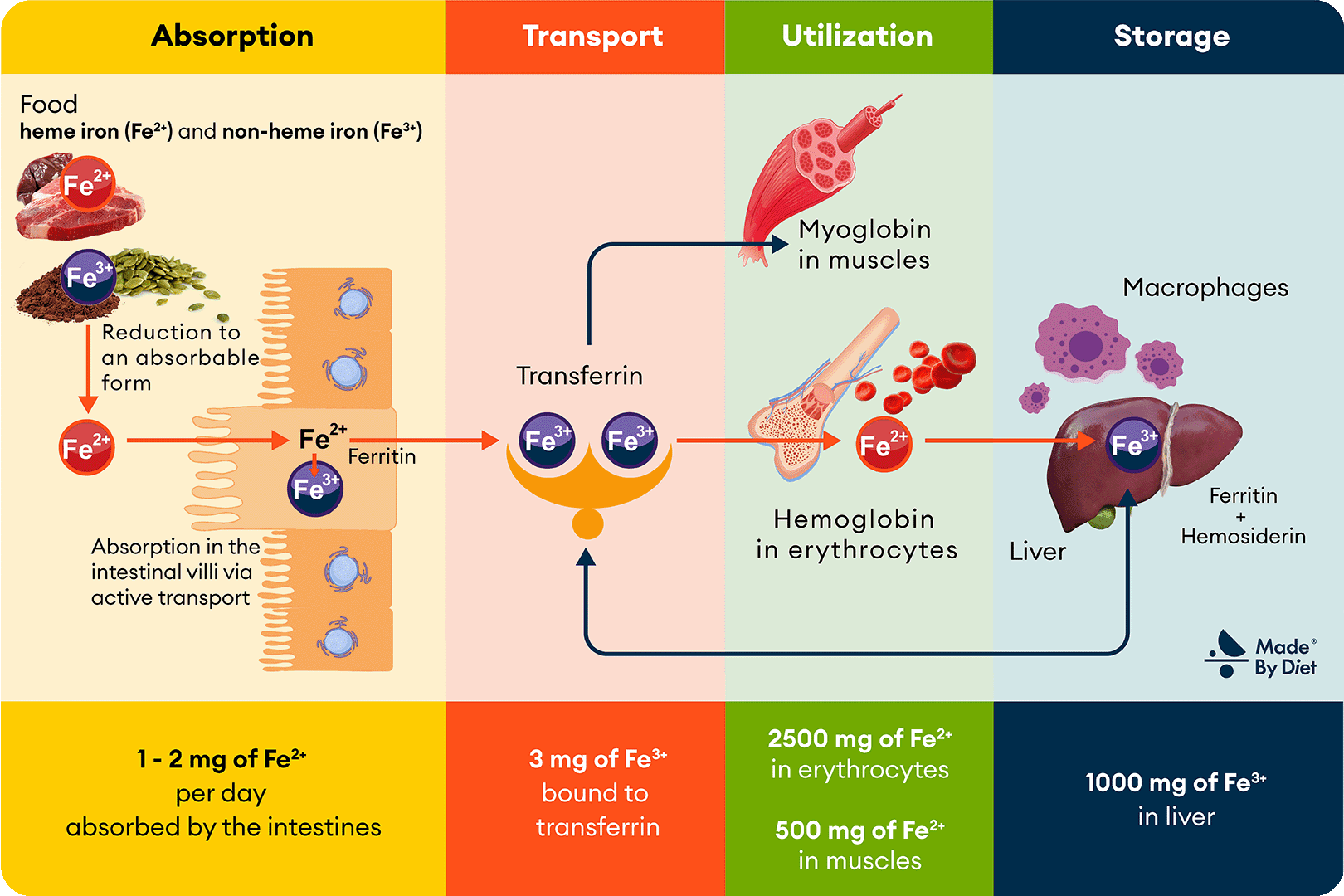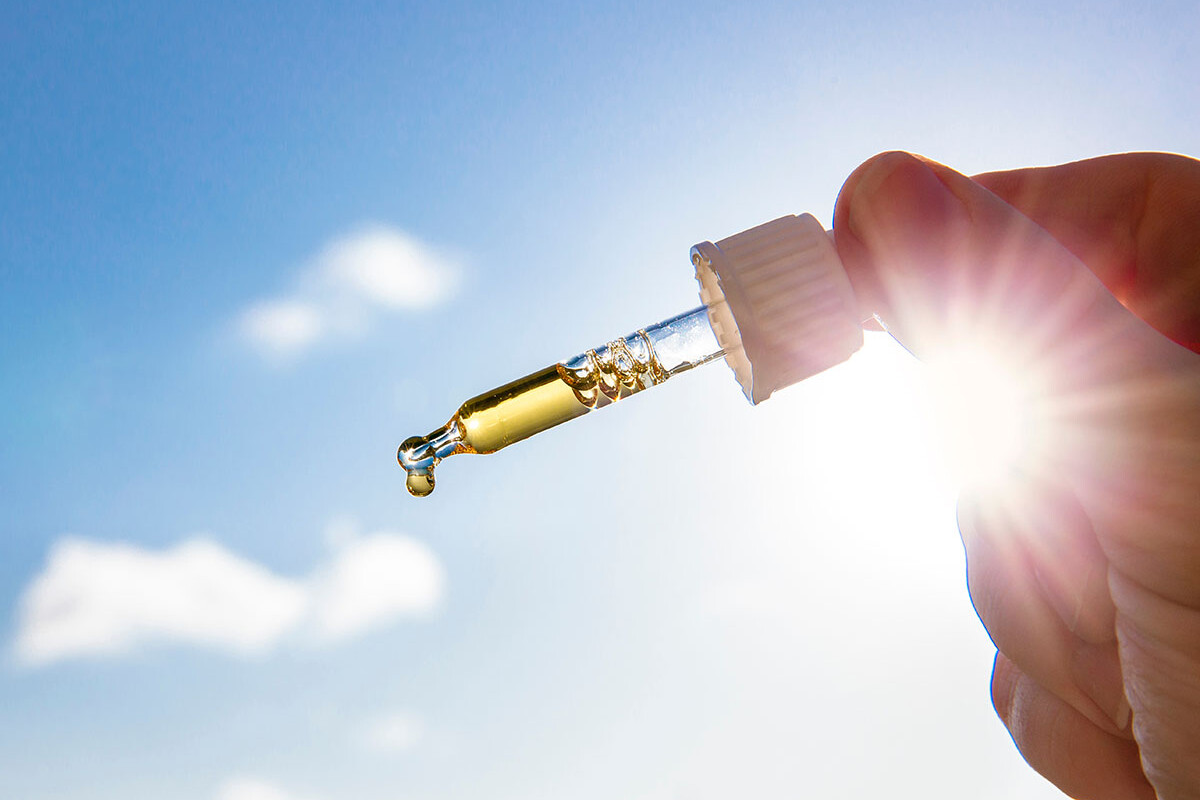The immune system – your body’s natural protective shield – plays a vital role in maintaining health. Every day, it monitors your body, identifying and neutralising potential threats such as bacteria, viruses, fungi and parasites. It also helps eliminate damaged cells and detect cancerous ones. Did you know that the human body is made up of around 40 trillion cells (40,000,000,000,000), of which as many as 2 trillion are immune cells, with a combined weight exceeding one kilogram? This highlights the immense power of the immune system and how much your health depends on it. That’s why it’s so important to take care of its efficiency – especially since it is largely influenced by your lifestyle. Your diet, physical activity, sleep and stress management can all strengthen or weaken your immune system. Discover how your everyday choices can effectively support your immune defences!
Authors: Klaudia Buczek, MSc Eng., Michał Miśta, MSc Pharm
Table of contents:
- What Is Immunity?
- What Is Immune Deficiency?
- Which Lifestyle Factors Have the Greatest Impact on Our Immunity
- Dietary Elements That Support Immunity – What Should We Eat to Strengthen the Body
- An Active Lifestyle and Immunity – How Physical Activity Strengthens the Body
- How Nature and Sunlight Support Immunit?
- Sleep and Recovery – How Rest Affects Immunity and Health
- Hormones and Immunity – How Stress and Sleep Affect Your Immune System
- Coping with Stress – Emotional Balance
- Hygiene and Immunity – How Daily Habits Protect Against Infections
- Vaccinations and Immunity – How They Protect the Body from Disease
- Regular Preventive Check-Ups – Which Ones Are Worth Doing to Stay Healthy?
- Does Sauna Boost Immunity? How Heat Affects the Immune System
- Does Cold Water Immersion Boost Immunity? Facts and Scientific Evidence
- How Do Alcohol and Smoking Weaken Immunity? The Impact of Stimulants on Health
- Immunity at Every Age – How to Support the Immune System Throughout Life
- The Impact of a Well-Balanced Diet on the Immune System
- How to Maintain a Healthy Lifestyle? The Pyramid of Healthy Eating and Physical Activity
- The Base of the Pyramid – Physical Activity
- Fruit and Vegetables – Essential for Immunity
- Why Should a Healthy Diet Be Based on Wholegrains?
- Sources of Protein – The Building Blocks of Immunity
- Healthy Fats – A Key Element of Nutritious Eating
- Hydration – The Key to Balance
- Limiting Salt, Sugar and Processed Foods
- How Does Nutritional Status Affect Immunity?
- How Much Should You Eat to Maintain a Healthy Diet and a Strong Immune System?
- Healthy Eating and Food Safety – How to Choose High-Quality Products
- Vitamin C and Antioxidants in the Diet – How Do They Support Immunity?
- Vitamin E – An Antioxidant with Immunomodulatory Effects
- Vitamin A and Immunity – A First Line of Defence
- Vitamin D and Immunity – How Its Deficiency Affects the Body
- Immunity and Gut Health – How the Gut Microbiota Influences the Immune System
- Prebiotics – Fuel for Beneficial Bacteria
- Probiotics – Friendly Bacteria Supporting Immunity
- Postbiotics – Gut-Derived Immunomodulators
- How to Combine Prebiotics, Probiotics and Postbiotics in Your Diet?
- Is There a Perfect Diet for Immunity? What Does the Science Say?
- The Harvard Healthy Eating Plate – Is It the Best Diet Model for Supporting Immunity?
- Principles of a Healthy Lifestyle – Summary
- References
1. What Is Immunity?
Immunity refers to the body’s ability to defend itself against harmful agents such as viruses, bacteria, fungi, or toxins. It is a complex system that functions like a vigilant guardian – protecting us from infections, supporting tissue regeneration and maintaining internal balance by eliminating damaged or potentially dangerous cells. The key player in this process is the immune system (also known as the immune defence system), which consists of a wide range of specialised cells – including macrophages, T and B lymphocytes and NK (natural killer) cells – as well as organs such as the thymus, spleen and lymph nodes. In addition, it involves chemical substances like cytokines, antibodies, complement proteins (e.g. C3 and C5) and interferons. All of these components work together at different levels to provide effective protection against threats [1, 2, 3].
There are two main types of immunity:
- Innate immunity (also known as nonspecific immunity), which serves as the body’s first line of defence. It acts immediately upon detection of a threat and includes physical barriers such as the skin and mucous membranes, as well as specialised immune cells like neutrophils, macrophages and NK cells, which respond quickly to the presence of pathogens. Innate immunity is nonspecific, meaning it does not differentiate between individual microorganisms – it responds similarly to various threats, aiming to neutralise them as quickly as possible.
- Acquired immunity (also referred to as adaptive or specific immunity), which develops over the course of life. Its key feature is the ability to “remember” pathogens the body has previously encountered, allowing for a faster and more effective response in the future. Unlike innate immunity, acquired immunity is highly specific – the immune system precisely recognises particular threats and activates targeted defence mechanisms. This response is based on the actions of T lymphocytes, which coordinate the immune response and eliminate infected cells and B lymphocytes, which, after activation, transform into plasma cells responsible for producing specific antibodies (immunoglobulins) that neutralise pathogens [1, 2].
Photo 1. Key Components of the Immune System, Divided into Innate (nonspecific) and Adaptive (acquired or specific) Immunity. From the first line of defence – physical and chemical barriers – through specialised immune cells, acute-phase proteins and the complement system, to the precise mechanisms of specific immunity, in which T lymphocytes, plasma cells and antibodies play a central role. This is a simplified diagram highlighting selected elements of the immune system, which in reality is far more complex and dynamic. Scientists continue to uncover new mechanisms behind its functioning and one of the most fascinating aspects is that as much as 70% of the body’s immune cells are located in the gut – more precisely, in the gut-associated lymphoid tissue (GALT). This is where vast numbers of T and B lymphocytes operate, constantly monitoring the contents of the gastrointestinal tract, responding to pathogens and maintaining a delicate balance between immune response and tolerance towards food components and the microbiota.
Both the innate and acquired immune systems work together to form an extraordinarily complex defence network. However, their effectiveness is not fixed – it can vary depending on a range of factors, which can be divided into those we cannot control (non-modifiable factors) and those we can influence (modifiable factors).
- Non-modifiable factors include genetics, age and inherited health predispositions, such as certain autoimmune diseases or congenital immune deficiencies.
- Modifiable factors relate to aspects of lifestyle, such as diet, physical activity, sleep quality, stress management and the environment we live in. Exposure to pollution, toxins, or living conditions can have a significant impact on the functioning of the immune system. These are the very areas where we have the power to consciously influence the condition of our bodies. We will explore them in detail in Chapter 3.
Although we cannot change our genes or age, we can actively shape our immune resilience through everyday choices. Scientific research increasingly confirms that lifestyle not only supports the functioning of the immune system but can also significantly enhance its effectiveness in fighting infections and inflammation.
2. What Is Immune Deficiency?
Immune deficiency is a condition in which the immune system does not function properly, increasing the body’s susceptibility to infections, cancers, autoimmune diseases and chronic inflammation. Depending on the underlying causes, immune deficiencies are categorised as either primary or secondary.
Primary Immune Deficiencies – What Are They and How Can They Be Recognised
Primary immune deficiencies are congenital disorders caused by genetic mutations that impair the functioning of the immune system. Individuals affected by these conditions often suffer from recurrent infections beginning in early childhood, although in some cases symptoms may not appear until adulthood. One of the most well-known examples is Severe Combined Immunodeficiency (SCID), in which genetic mutations lead to a complete absence or severe deficiency of T and B lymphocytes. While innate immunity may still function correctly, the body is unable to effectively eliminate many pathogens. This condition may be suspected based on frequent, severe infections that do not resolve despite treatment. Diagnosis is based on laboratory tests that assess the number and function of lymphocytes. In recent years, advances in gene therapy have offered new hope for more effective treatment of these rare but serious diseases, giving patients increasing chances of leading normal lives.
Secondary (Acquired) Immune Deficiencies – Where Do They Come From and How Can They Be Prevented
Secondary (acquired) immune deficiencies develop over time as a result of external factors. They can lead to increased vulnerability to infections and a reduced ability of the body to combat pathogens. The most common causes include:
- Chronic illnesses, such as HIV/AIDS, which destroy CD4⁺ T lymphocytes and severely weaken the body’s defence mechanisms (see Photo 1), as well as diabetes, kidney disease and cancer, which can impair immune function.
- Use of immunosuppressive medications, for example following organ transplants, in the treatment of autoimmune diseases (e.g. rheumatoid arthritis), or during chemotherapy, which damages immune cells.
- Malnutrition and poor dietary habits, including nutrient-deficient diets, can result in a lack of key elements essential for immune function. Deficiencies in zinc, vitamin D, vitamin A, iron, selenium, iodine and protein can weaken the immune system and increase susceptibility to infections. This is especially relevant for individuals following unbalanced elimination diets, such as restrictive forms of vegan and vegetarian diets, gluten-free diets, or the low-FODMAP diet, which can lead to deficiencies if not properly managed.
- Chronic stress, which elevates cortisol levels, weakening immune responses and promoting inflammation.
- Long-term exposure to toxins and pollutants, such as tobacco smoke, smog, or certain chemical substances, which can impair immune cell function.
- Disruptions to the gut microbiota, caused by factors such as prolonged antibiotic use, low-fibre diets, or chronic inflammatory bowel diseases, all of which can negatively impact the immune system.
Photo 2. Gut Health and Immunity – From Balance to Dysbiosis and Leaky Gut. This illustration shows the progression from a state of symbiosis, in which the gut microbiota supports the immune system, to dysbiosis – an imbalance in the gut microbiota where beneficial bacteria are displaced by pathogenic microbes – and increased intestinal permeability. These changes can lead to chronic inflammation and weakened immunity. Such a state is observed in autoimmune diseases, chronic infections, Irritable Bowel Syndrome (IBS) and in individuals exposed to prolonged stress and poor diet. The digestive system plays a crucial role in immune regulation, not only as a mechanical barrier but also through interactions between the microbiota and immune cells. In a healthy gut, diverse microorganisms – including beneficial bacteria – help maintain homeostasis and modulate immune responses. However, factors such as a low-fibre diet, chronic stress, antibiotic use, or exposure to toxins can disrupt the microbiota, weaken the gut barrier and increase the risk of secondary immune deficiencies.
Immune deficiencies can have a significant impact on quality of life. While primary deficiencies require specialised medical treatment, in the case of secondary immune deficiencies, lifestyle plays a key role. A well-balanced diet, regular physical activity, stress reduction and attention to sleep quality can all support the functioning of the immune system – even when its efficiency has been compromised by external factors. In the following sections of this article, we will explore how conscious, everyday choices can help maintain immunity at an optimal level, regardless of an individual’s underlying health condition.
3. Which Lifestyle Factors Have the Greatest Impact on Our Immunity
Lifestyle is a broad concept encompassing various aspects of our daily choices and habits that influence both physical and mental health. All these elements play a vital role in the proper functioning of the body, including the immune system. Let’s take a closer look at the key components of lifestyle that contribute most significantly to building immunity.
Dietary Elements That Support Immunity – What Should We Eat to Strengthen the Body
A healthy, balanced diet is one of the essential pillars of strong immunity. Regularly consuming meals rich in vital nutrients – such as protein, vitamins (especially vitamin D, vitamin C and vitamin E), minerals (iron, zinc, selenium, magnesium), omega-3 fatty acids, probiotics, antioxidants and fibre – supports the proper functioning of the immune system. At the same time, poor dietary habits – such as excessive intake of sugar, trans fats and highly processed foods – can promote inflammation and weaken immune defences. Which foods support the immune system best? What dietary mistakes should be avoided? We will explore the details in Chapter 4.
An Active Lifestyle and Immunity – How Physical Activity Strengthens the Body
Regular physical activity has a positive impact on the immune system and the body’s overall condition. Movement improves blood circulation, aiding the transport of immune cells and also helps regulate body weight, reduce stress levels and enhance mood – all of which contribute to better immunity.
Moderate vs. Intense Physical Activity
- Moderate physical activity (e.g. walking, yoga, moderate-intensity workouts) offers the greatest benefits for immunity. It supports immune function and reduces the risk of infections.
- Intensive physical exertion, particularly if prolonged or high in intensity, may lead to a temporary suppression of immune function. Research shows that this decrease can last between 3 and 72 hours after the workout.
How to Introduce Healthy Movement into Your Daily Routine
Adding regular physical activity to your lifestyle doesn’t require drastic changes. It’s worth starting with small steps – short walks, gentle home exercises, or cycling. The key is to gradually increase both intensity and duration, adjusting them to your abilities and fitness level. Remember: a healthy body nurtures a healthy mind – every bit of movement supports not only physical but also mental well-being.
Planning is key to staying consistent. Setting a fixed time for activity – such as a morning workout, evening walk, or several short stretching breaks during the day – can help develop a sustainable habit. Choosing an activity you enjoy is equally important. It might be dancing, yoga, swimming, or gym workouts – what matters most is that the activity suits your preferences.
Daily life offers plenty of opportunities to move. Instead of taking the lift, you can choose the stairs; you might get off the bus or tram a stop early and walk the rest of the way. Even short breaks at work, spent standing up and stretching, can significantly boost your well-being and energy.
For those who prefer working out at home, it might be helpful to invest in some basic equipment, like a yoga mat, dumbbells, or resistance bands. These tools allow for a variety of workouts regardless of weather or external circumstances. Exercising with friends or family can also increase motivation, support regularity and make physical activity more enjoyable.
Daily movement doesn’t need to be difficult or time-consuming – what truly matters is consistency and tailoring activity to your individual needs. Even small, gradual changes can bring substantial benefits for your health and immune function.
How to Support Immunity During Intense Training
In the case of high-intensity training – particularly for professional athletes or highly active amateurs – proper peri-workout nutrition plays a key role alongside a healthy, balanced diet. This type of nutrition not only supports recovery and supplies energy but also has a significant impact on immune function [19, 20].
Consuming carbohydrates before and after physical exertion can help reduce the negative effects of intense training on the immune system. Carbohydrates lower metabolic stress, support the body’s recovery processes and reduce the risk of immune suppression. This is especially important because glucose is a primary energy source for immune cells, including lymphocytes, neutrophils and macrophages [19].
Phagocytes – immune cells responsible for engulfing and neutralising pathogens – use glucose up to ten times more efficiently than glutamine when both substrates are available at physiological levels [19]. These include neutrophils and macrophages, which play a key role in innate immunity – the body’s first line of defence. Their task is to identify, engulf and destroy pathogens and damaged cells before the more specialised mechanisms of adaptive immunity are activated.
Moreover, studies have shown that immune cells such as lymphocytes and macrophages require sufficient glucose levels to proliferate properly and effectively combat pathogens. This process, known as proliferation, involves rapid cell division in response to threats such as infection. Scientific experiments have demonstrated that when lymphocytes and macrophages are stimulated by certain substances (mitogens that trigger their activation), their multiplication occurs efficiently only if glucose levels exceed the standard physiological baseline [19].
Immune cells have an exceptionally high metabolic rate, which highlights the importance of providing them with the necessary nutrients to ensure they can perform their protective functions effectively [19]. On the other hand, a diet low in carbohydrates may further weaken immune function, especially under high training loads when energy demands are significantly increased.
Photo 3. Regular Moderate Physical Activity as a Foundation of the Healthy Eating and Physical Activity Pyramid. Studies show that physical movement supports immune system function, reduces stress and promotes microcirculation, facilitating the transport of immune cells throughout the body. Incorporating outdoor exercise into your daily routine is one of the most important principles of a healthy lifestyle, helping to maintain both good physical condition and strong immunity.
How Nature and Sunlight Support Immunity
Spending time outdoors is one of the simplest – yet most effective – ways to support the immune system. Regular contact with nature benefits both the body and mind, helping the body cope better with the challenges of everyday life.
One of the key health-promoting aspects of being in nature is exposure to sunlight, which stimulates the skin to produce vitamin D – a nutrient essential for the proper functioning of the immune system. Although we will discuss its role in the diet in more detail later in the article, it’s worth noting that even just a few minutes of sun exposure each day can significantly contribute to maintaining adequate vitamin D levels.
In addition to sunlight, spending time among trees – especially in forests – also positively influences immunity. In Japan, the popular practice of forest bathing (shinrin-yoku), which involves immersing oneself in the atmosphere of the forest through mindful presence among the trees, not only reduces stress but also stimulates immune cell activity. Studies suggest that contact with phytoncides – natural substances released by trees – may increase the number of NK (natural killer) cells, which play a vital role in defending the body against pathogens [18].
In short, time spent in nature is more than just a way to relax – it’s a natural and effective way to support immune health and should be a regular part of a healthy lifestyle.
Sleep and Recovery – How Rest Affects Immunity and Health
Sen jest fundamentem zdrowego stylu życia, odgrywając kluczową rolę w prawidłowym funkcjonowaniu organizmu i wzmacniając odporność. To właśnie podczas snu układ odpornościowy produkuje cytokiny – białka, które pomagają zwalczać infekcje i stany zapalne. Brak odpowiedniej ilości lub jakości snu może osłabić odporność organizmu, zwiększając ryzyko infekcji i pogarszając ogólny stan zdrowia.
Sleep is a cornerstone of a healthy lifestyle, playing a key role in the proper functioning of the body and supporting immune strength. During sleep, the immune system produces cytokines – proteins that help combat infections and inflammation.
Insufficient or poor-quality sleep can weaken immunity, increasing the risk of infections and negatively impacting overall health.
Following the core principles of healthy sleep helps the body regenerate and enhances overall well-being. It’s worth paying attention to the following habits:
- Keep a consistent sleep and wake schedule, even on weekends.
- Limit the use of blue light-emitting devices (e.g. smartphones, computers) at least one hour before bedtime to support melatonin production.
- Create optimal sleep conditions: maintain a bedroom temperature of 16–19°C, ensure quiet and eliminate light.
- Avoid caffeine, alcohol and heavy meals in the evening, as these can disrupt the body’s recovery process.
Healthy rest habits are an essential part of a lifestyle that supports strong immunity and proper physiological function.
Hormones and Immunity – How Stress and Sleep Affect Your Immune System
The immune system is closely linked with the body’s hormonal balance. Hormones regulate both defence mechanisms and inflammatory processes, thereby influencing the effectiveness of immune responses. Three hormones in particular – melatonin, cortisol and insulin – play a key role in this relationship.
Melatonin – Supporting Immunity During Sleep
Melatonin, a hormone produced mainly at night by the pineal gland, is vital for regulating the body’s circadian rhythm. Maintaining healthy melatonin levels not only improves sleep quality but also enhances immune function. Melatonin has anti-inflammatory and antioxidant properties, and a deficiency may lead to a weakened immune response and increased susceptibility to infections.
Cortisol – The Impact of Stress on Immunity
Cortisol, often referred to as the “stress hormone”, has beneficial effects in short-term situations by helping to suppress excessive inflammation. However, chronic stress and prolonged elevated cortisol levels can weaken the immune system, reduce lymphocyte production and increase vulnerability to infections. Disrupted circadian rhythms, lack of restorative sleep and long-term stress can also dysregulate the hypothalamic–pituitary–adrenal (HPA) axis, further impairing immune function.
Insulin – Metabolic Balance and Immunity
Although insulin is primarily associated with regulating blood glucose levels, it also plays a role in immune system function. Stable insulin levels help maintain the body’s homeostasis, whereas insulin resistance and impaired carbohydrate metabolism may promote chronic inflammation and weaken the body’s defence mechanisms.
Both sleep and stress regulation are therefore key to maintaining balanced immune processes. Supporting these areas through a healthy lifestyle can enhance immunity and reduce the risk of infections and chronic diseases.
Coping with Stress – Emotional Balance
Chronic stress weakens the immune system by causing an overproduction of cortisol, which suppresses the body’s defensive responses. The ability to manage stress is essential for maintaining health. Incorporating relaxation techniques such as meditation, mindfulness, or breathing exercises into your daily routine can be highly beneficial.
The relationship between chronic stress and the immune system is currently the subject of extensive research. Stress can disrupt the gut microbiota, reduce the number of lymphocytes responsible for immune response and trigger inflammatory reactions which, over time, may contribute to the development of chronic diseases. By impairing immune function, long-term stress has serious consequences for our health. Unfortunately, we can’t always eliminate the source of our stress, which is why it is essential to find effective coping strategies when challenges arise. Effective stress management techniques include stretching, breathing exercises, meditation and reducing screen time on computers and phones.
Photo 4. Stress and Health – How to Maintain Emotional Balance? Chronic stress is one of the key risk factors for lifestyle-related diseases, as it weakens the immune system and disrupts the body’s normal functioning. Prolonged tension can lead to inflammation, hormonal imbalances and a reduction in lymphocyte levels – the very cells responsible for defending against infections. The most important principles of a healthy lifestyle include not only diet and physical activity but also effective stress management strategies, such as relaxation techniques, meditation, outdoor activities and adequate sleep. Conscious stress management is a vital element of preventive healthcare, supporting both immune resilience and mental well-being.
Hygiene and Immunity – How Daily Habits Protect Against Infections
Every day, our bodies come into contact with millions of microorganisms – some harmless, others capable of causing infections. Good hygiene is the first line of defence, helping to reduce exposure to harmful bacteria, viruses and fungi, thereby lowering the risk of illness. What hygiene habits should be included in a healthy lifestyle to effectively support immune function?
Hands – The Most Common Route of Pathogen Transmission
Throughout the day, we touch dozens of surfaces – door handles, phones, banknotes – that may harbour viruses and bacteria. That’s why regular handwashing is one of the most important habits for preventing infections. Key moments include:
- before eating and preparing food,
- after using the toilet,
- after returning home, from work or public transport,
- after contact with someone who is ill.
Washing hands with soap and water for at least 20 seconds effectively removes most pathogens. When soap and water are not available, alcohol-based hand sanitisers (minimum 60%) are a good alternative.
Environmental Hygiene – Fewer Germs in Everyday Spaces
Cleanliness at home and in the workplace also matters. Regularly airing out rooms reduces the concentration of airborne viruses and disinfecting frequently touched surfaces (such as keyboards, smartphones and light switches) lowers the risk of infection.
Sleep hygiene is also important – bedding and towels should be washed at appropriate temperatures and sponges and cloths replaced regularly, as they can harbour bacteria.
How to Avoid Infections in Public Spaces
In crowded places, the risk of encountering viruses and bacteria increases. Here are a few effective strategies:
- avoid touching your face (especially eyes, nose and mouth) with unwashed hands,
- keep a safe distance from others during peak infection seasons,
- wear face masks in high-risk areas (e.g. during flu season or in crowded indoor spaces).
By incorporating these simple yet effective hygiene habits into daily life, we can significantly reduce our exposure to infectious agents and support the immune system in doing its job.
Hygiene and Immunity – Don’t Overdo Disinfection
While hygiene is essential, excessive sterility can paradoxically weaken the immune system. The immune system needs regular exposure to a variety of microorganisms to develop its ability to defend the body effectively. This is especially important in children – overly sanitised environments may increase the risk of allergies and reduce resistance to future infections.
Good hygiene habits are a simple yet effective way to reduce the risk of illness – just a few daily actions can significantly improve protection against infections for you and your loved ones.
Vaccinations and Immunity – How They Protect the Body from Disease
The immune system is an incredibly precise and powerful defence mechanism, but it needs proper training to respond effectively to threats. One of the best ways to strengthen it is through vaccination, which activates what’s known as active immunity – the body’s natural ability to recognise and neutralise pathogens.
Active vs. Passive Immunity – What’s the Difference?
- Active immunity – the body builds its own protection against a disease, either after exposure to a pathogen or through vaccination.
Examples: recovering from chickenpox or being vaccinated against measles. - Passive immunity – the body receives ready-made antibodies from an external source, for example from the mother during infancy, or in the form of antiserum given in emergencies (such as after a snakebite).
How Do Vaccines Work?
A vaccine simulates an infection by introducing a weakened or inactivated form of a virus or bacterium, or fragments of it. This allows the immune system to learn how to recognise the threat and build immune memory. When the real pathogen appears, the body can respond quickly and effectively – often before any symptoms develop.
Examples of Vaccinations:
- Influenza – seasonal flu vaccines help the body adapt to rapidly mutating flu strains.
- COVID-19 – mRNA vaccines (Pfizer, Moderna) train the body to recognise the spike protein of the SARS-CoV-2 virus, significantly reducing the risk of severe illness.
- Tetanus – the bacterium that causes tetanus does not spread between people but enters the body through wounds. Vaccination provides long-lasting protection.
Why Are Vaccinations So Important?
- They protect you and your loved ones – by reducing the risk of severe illness and complications.
- They create a barrier to viruses and bacteria – the more people vaccinated, the harder it is for pathogens to spread, protecting even those who cannot be vaccinated.
- They prevent epidemics – thanks to vaccines, smallpox has been eradicated, and cases of polio and measles have been drastically reduced.
Vaccinations are a smarter way to strengthen immunity – without risking the consequences of serious illness. They allow the body to recognise threats early and respond before an infection can take hold, giving us the upper hand in the fight against viruses and bacteria.
Regular Preventive Check-Ups – Which Ones Are Worth Doing to Stay Healthy?
Regular preventive check-ups are a key part of a healthy lifestyle. They support the proper functioning of the body and allow for early detection of potential health issues before they develop into more serious conditions. By undergoing routine tests, you can monitor your health and respond early to any deficiencies or imbalances that may weaken the immune system.
Basic tests worth performing regularly include:
- Complete blood count (CBC): Provides an overview of general health and helps assess the level of white blood cells, which are essential for immune defence.
- Vitamin D level: Deficiency is commonly linked to reduced immune function.
- Lipid profile and blood glucose levels: Help assess the risk of metabolic diseases, which can impact overall health and vitality.
- Electrolyte and mineral levels: Including zinc and magnesium, which are important for the proper functioning of the immune system.
The frequency of check-ups depends on factors such as age, current health status and individual risk factors. It’s advisable to consult a healthcare professional to establish a personalised schedule. Monitoring your health through regular testing not only strengthens the immune system but also contributes to long-term physical and mental well-being.
Photo 5. Regular Preventive Check-Ups as a Key Component of a Healthy Lifestyle. Preventive tests are essential for the early detection of lifestyle-related diseases such as diabetes, hypertension, or lipid disorders – conditions that can develop silently for years without noticeable symptoms. Many people overlook the fact that it’s impossible to fully implement the principles of a healthy lifestyle without consciously monitoring one’s health. That’s why it’s worth having blood tests done regularly – at least once a year – and addressing any abnormalities before they progress into more serious health issues.
Does Sauna Boost Immunity? How Heat Affects the Immune System
Regular sauna use supports the immune system and overall physical well-being. High temperatures trigger physiological responses in the body that can lead to various health benefits:
- Improved circulation: Heat exposure causes blood vessels to dilate and increases blood flow, aiding in the removal of toxins and enhancing the delivery of oxygen and nutrients throughout the body.
- Immune system stimulation: The rise in body temperature activates the production of heat shock proteins (HSPs), which assist in cell regeneration and the synthesis of antibodies essential to immune responses.
- Nervous system regulation: Sauna use increases sympathetic nervous system activity, helping to elevate mood, reduce the sensation of pain and promote overall relaxation.
- Reduced inflammation: Regular sauna sessions may lower levels of chronic inflammation, supporting long-term immune health.
Remember to stay hydrated: Profuse sweating in the sauna results in the loss of water and electrolytes. To prevent dehydration, drink mineral water or isotonic beverages before and after your session. Avoid alcohol, as it further impairs the body’s ability to regulate temperature.
Does Cold Water Immersion Boost Immunity? Facts and Scientific Evidence
Cold water immersion, commonly known as winter swimming or cold plunging, is a practice gaining popularity due to its reported benefits on immune health. Exposure to cold acts as a form of hormetic stress – a mild, controlled stressor that stimulates the body to adapt and strengthen its defence mechanisms.
How does cold water immersion affect immunity?
Immersing the body in cold water leads to a sharp increase in noradrenaline production and enhances the activity of immune cells such as leukocytes and lymphocytes. This may help boost immune responses and reduce the risk of infections. Regular cold exposure has also been linked to reduced inflammation and improved circulation.
Things to keep in mind
Cold water immersion is not suitable for everyone – individuals with heart conditions, high blood pressure, or other health issues should consult a doctor before starting. Beginners should introduce cold exposure gradually and ensure proper warm-up before entering the water.
When combined with a healthy lifestyle, cold water immersion may support immune resilience and contribute to improved overall well-being.
Photo 6. Cold Conditioning, Stronger Immunity! Cold water immersion isn’t just an extreme activity – it’s a scientifically supported way to strengthen the immune system. Regular exposure to cold activates immune responses by increasing the number of white blood cells and enhancing the body’s ability to fight infections. Studies show that people who regularly practise cold water swimming are less likely to catch colds or the flu! Cold baths are also a valuable part of a healthy lifestyle, improving circulation and supporting recovery. Ready to take the icy plunge for better health?
How Do Alcohol and Smoking Weaken Immunity? The Impact of Stimulants on Health
One of the most effective ways to support the immune system is to quit smoking. Smoking not only increases the risk of cancer but also negatively affects gut health, raising the likelihood of developing gastrointestinal diseases and cardiovascular conditions such as atherosclerosis and high blood pressure. Moreover, research shows that tobacco use reduces the ability of T lymphocytes to release pro-inflammatory mediators, significantly weakening the body’s immune response. For this reason, quitting smoking is crucial for maintaining a properly functioning immune system.
It’s also important to note that there is currently no evidence that popular e-cigarettes are a safe alternative to traditional tobacco. They contain toxic substances such as nicotine, acetaldehyde, acetone, acrolein and formaldehyde. Studies indicate that vaping negatively impacts both the respiratory and cardiovascular systems, leading to vascular damage and increased risk of hypertension. Additionally, there is no clear scientific consensus that e-cigarettes help people quit smoking – in fact, they may perpetuate nicotine addiction. Therefore, quitting smoking should mean completely eliminating all forms of tobacco products.
Similarly, alcohol abuse impairs immune function, increasing susceptibility to infections and raising the risk of contracting communicable diseases. As a result, limiting alcohol intake – or better yet, eliminating it altogether – is strongly recommended.
Numerous studies confirm that alcohol is a proven carcinogen, increasing the risk of cancers such as oral, throat, oesophageal, liver, colorectal and breast cancer. One of the most dangerous mechanisms is the conversion of alcohol into acetaldehyde – a compound that damages DNA and disrupts cellular repair processes, potentially leading to cancerous transformations. Eliminating alcohol from the diet is a key recommendation in cancer prevention and long-term health protection.
While not nearly as harmful as tobacco or alcohol, caffeine consumption also deserves attention. In moderate amounts, caffeine can enhance focus and reduce fatigue. However, excessive intake of caffeine-rich drinks – such as coffee, sugary colas, or energy drinks – may negatively impact sleep quality. Sleep is one of the most critical elements of a healthy lifestyle. It plays a vital role in the body’s recovery and in maintaining a strong immune system. So instead of reaching for another cup of coffee, it’s often better to focus on keeping a consistent daily rhythm and getting enough rest.
Photo 7. Social Acceptance of Harmful Habits and Their Impact on Immunity. Alcohol and cigarettes are widely accepted in many social settings, despite their well-documented negative effects on health. Regular alcohol consumption weakens the body’s defence mechanisms, promotes inflammation and increases the risk of cardiovascular diseases and cancer – the World Health Organization classifies alcohol as a carcinogenic substance. Smoking further damages the mucous membranes of the respiratory tract, making it easier for pathogens to enter the body and weakening immune function. Eliminating alcohol and tobacco use is a crucial step toward a healthier lifestyle that supports the immune system and lowers the risk of chronic diseases.
Immunity at Every Age – How to Support the Immune System Throughout Life
Age plays a significant role in determining immune function. From birth onward, immunity is shaped by two main factors: exposure to environmental elements and nutrition. Breastfeeding has a particularly beneficial impact on the immune system and is especially recommended for infants from families with a history of immune-related conditions.
The first years of life are a critical period for developing immunity. Factors such as having pets, siblings, the use of antibiotics and dietary habits can all influence the maturation of the immune system.
As we age, immune function may naturally decline. In older adults, this is often linked to nutritional deficiencies – particularly of protein and zinc – which are relatively common in this age group. Therefore, immune-supporting strategies should focus on addressing these deficiencies and ensuring proper nutrition to help maintain immune resilience throughout the lifespan.
4. The Impact of a Well-Balanced Diet on the Immune System
Nutrition plays a vital role in the functioning of every cell in the body – including those responsible for the proper functioning of the immune system. Providing the body with the right amount of nutrients is not only essential for maintaining health but also a key mechanism for supporting protection against infections and chronic diseases.
For the body to function efficiently, the diet should be balanced – meaning it must supply all essential nutrients in the right proportions. This includes an optimal intake of protein, fats and carbohydrates, as well as vitamins and minerals that support immune function. It is important to remember that the variety of food is just as crucial as its quality – the more diverse your meals, the greater the chance of supplying everything your body needs.
In contrast, a deficient diet – one lacking one or more key nutrients – can lead to weakened immunity and greater susceptibility to infections. For example, inadequate intake of antioxidant vitamins (C, E, A), zinc, or selenium can impair the body’s defence mechanisms. Protein deficiency may reduce antibody production, while a lack of healthy fats, especially omega-3 fatty acids, may contribute to immune system overreactivity and increased inflammation.
A properly composed diet not only supports immunity but also helps regulate inflammation and affects the function of the gut microbiota – one of the most important components of the immune system. In the following sections, we will take a closer look at how healthy eating habits help strengthen immunity and how to adjust your daily meals to promote overall well-being.
How to Maintain a Healthy Lifestyle? The Pyramid of Healthy Eating and Physical Activity
A healthy lifestyle is not just about diet – it also includes regular physical activity, adequate hydration and proper recovery and rest. To help make the principles of healthy nutrition more accessible and understandable, experts from the Polish Institute of Food and Nutrition developed the Pyramid of Healthy Eating and Physical Activity, which presents a clear hierarchy of the most important habits that influence our health and immune resilience.
So, What Should a Daily Diet and Lifestyle Look Like According to the Healthy Eating and Physical Activity Pyramid?
Photo 8. The Healthy Eating Pyramid – How to Start Eating Well. The Healthy Eating Pyramid is a visual guide to the key principles of building a healthy, balanced diet. It was developed by the Polish Institute of Food and Nutrition based on World Health Organization (WHO) guidelines and the latest Polish and international scientific research. At its foundation lies daily physical activity, as well as the elimination of smoking and excessive alcohol consumption. A healthy diet should be rich in vegetables and fruits, which are essential sources of vitamins, minerals and fibre. Good nutritional habits also include regular consumption of wholegrain products, which provide energy and support metabolism. A well-rounded diet should also include protein sources such as fish, legumes and lean meats, as well as dairy products, which are vital for bone health. It’s important to include foods rich in vitamins and healthy fats, found in nuts, olive oil and oily fish. The pyramid also emphasises the need to limit salt, sugar and processed foods, as these can have a negative impact on overall health. This pyramid reflects Polish dietary recommendations tailored to the local population’s health needs and culinary culture. Eat vegetables, drink water, stay active – this is the key to longevity and lasting well-being!
The Base of the Pyramid – Physical Activity
It’s no coincidence that physical activity lies at the base of the Healthy Eating Pyramid. Regular movement improves circulation, supports metabolism and helps regulate blood sugar levels – all of which directly influence immune function. Studies show that moderate physical activity, such as brisk walking, cycling, or swimming, can reduce inflammation in the body and enhance the performance of the immune system.
Fruit and Vegetables – Essential for Immunity
The second most important pillar of a healthy diet is the consumption of vegetables and fruit, which should make up at least half of your plate at every meal. If you’re looking to start eating more healthily, increasing your intake of fresh vegetables is one of the simplest and most effective first steps.
Experts have long emphasised the importance of the “eat more vegetables” rule – they are rich in antioxidant vitamins (vitamins C, A and E), fibre and flavonoids, all of which support gut microbiota and reduce the risk of infections. Vegetables and fruit are also excellent sources of prebiotics – compounds that nourish beneficial gut bacteria and stimulate the production of short-chain fatty acids (SCFAs), which strengthen both immunity and the intestinal barrier.
Types of vegetables and fruit most beneficial to immunity:
- Dark leafy greens (spinach, kale) – high in folate and vitamin K, they help produce immune cells and regulate inflammation.
- Red and orange fruits and vegetables (peppers, carrots, pumpkin, berries) – rich in beta-carotene, which is converted into vitamin A, essential for maintaining healthy skin and mucous membranes – the body’s first line of defence.
- Fermented vegetables (e.g. sauerkraut, kimchi, pickled cucumbers) – natural sources of probiotics that improve gut health, balance the microbiota and enhance immune strength.
- Onion, garlic, leek – contain sulphur compounds like allicin, with antibacterial, antiviral and microbiota-supporting properties.
- Berries (e.g. blueberries, raspberries, blackberries) – rich in polyphenols that reduce oxidative stress and inflammation, supporting the body’s immune defences.
Eating a wide variety of fruits and vegetables is crucial for maintaining gut health, which is directly linked to immune function. The greater the diversity of plant-based foods in your diet, the better equipped your immune system will be – both innate and adaptive.
Why Should a Healthy Diet Be Based on Wholegrains?
The type of carbohydrates you eat matters greatly for your health and immunity. Learning to eat well includes making informed food choices and wholegrain products are among the best. Whole grains are grains that have not been refined and therefore retain all of their natural nutrients. Each grain consists of three parts:
- Bran – the outer layer, rich in fibre, antioxidants and minerals.
- Germ – the nutrient-dense core, containing healthy fats, B vitamins and enzymes.
- Endosperm – the largest part, providing starch and protein for energy.
Wholegrain foods provide:
- Soluble and insoluble fibre, which supports gut health, regulates digestion and strengthens the intestinal barrier.
- Short-chain fatty acids (SCFAs) – produced during the fermentation of fibre, with anti-inflammatory effects that benefit immune function.
- B vitamins (B1, B6, B9) and minerals such as zinc, magnesium and iron – all essential for the proper functioning of lymphocytes and antibody production.
Wholegrains like buckwheat, brown rice, wholemeal bread and oats also help stabilise blood sugar levels, reducing the risk of inflammation and insulin resistance. They enhance gut microbiota diversity – a key principle of healthy nutrition – and support the growth of probiotic bacteria like Bifidobacterium and Lactobacillus, which are known to boost immunity and improve gut function. Additionally, wholegrain products are a core component of cholesterol-lowering diets, as their high soluble fibre content helps reduce LDL cholesterol. In contrast to diets high in simple sugars and processed foods, wholegrain-based eating supports both metabolic health and immune defence.
Photo 9. Wholegrain or Just Multigrain? Know What You’re Really Eating. The bread in the photo is an example of a wholegrain product with added seeds – a nutritious component of a balanced, healthy diet. Wholegrain foods are made from flour that contains the entire grain: the bran, germ and endosperm. As a result, they are rich in fibre and provide valuable vitamins and minerals that support the body on a daily basis. But beware of marketing traps! Not every “seeded bread” is truly wholegrain. The term “multigrain” may sound healthy, but it simply means that various seeds – such as sunflower, flax, or sesame – have been added to refined flour. This kind of bread may look wholesome but often lacks the fibre and nutrients found in genuine wholegrain products. Want to maintain a healthy, balanced diet? Read food labels carefully! Look for terms like “100% wholegrain” or “wholegrain flour” listed as the first ingredient – that’s the best way to ensure your food choices are truly nutritious.
Sources of Protein – The Building Blocks of Immunity
Protein is an essential component of the diet, serving as the foundation for the production of antibodies and immune cells. An adequate intake of protein also supports tissue repair and helps maintain a healthy gut microbiota, which plays a crucial role in immune system function.
The Healthy Eating Pyramid recommends a variety of food groups that provide high-quality protein:
- Lean meat, fish and eggs – excellent sources of complete amino acids necessary for the production of immune enzymes and antibodies. Fatty fish like salmon and mackerel are also rich in omega-3 fatty acids with anti-inflammatory effects.
- Legumes (lentils, chickpeas, beans, peas, soy) – a great plant-based alternative to animal protein, rich in fibre and iron. Plant proteins support gut microbiota health and may reduce inflammation.
- Dairy products (natural yoghurt, kefir, cottage cheese) – supply protein, calcium and probiotics, which support gut flora and help modulate the immune system. Regular consumption of fermented dairy is directly linked to improved immunity.
- Nuts and seeds (almonds, walnuts, pumpkin seeds, flaxseed) – provide protein along with zinc and vitamin E, which support immune function and act as antioxidants.
Balancing Animal and Plant-Based Proteins
Research indicates that excessive consumption of animal protein – especially red and processed meats – may promote inflammation by altering gut microbiota. For this reason, it’s important to diversify protein sources and increase the proportion of plant-based proteins in your diet, which may have a protective effect on immunity.
Protein and Immunity – Key Amino Acids
A lack of protein or essential amino acids can impair antibody production and weaken immunity, even if vitamin and mineral intake is adequate. Vegetarian and vegan diets can support immune health, provided all essential amino acids are supplied in the right proportions. Protein requirements vary depending on age, health status and physical activity level – for healthy adults, the average daily need is approximately 0.9 g/kg of body weight.
Key immune-supporting amino acids:
- Arginine – has immunostimulatory effects and supports recovery. Supplementation has been shown to reduce hospital stays following surgery.
- Glutamine – vital for the function of lymphocytes and intestinal cells, which act as the body’s first line of defence.
- Taurine – has immunomodulatory properties that support the activity of white blood cells.
Healthy Fats – A Key Element of Nutritious Eating
Not all fats are harmful – in fact, the right kinds of fats are crucial to a balanced diet and immune health.
- Omega-3 unsaturated fatty acids, found in oily fish (salmon, mackerel, sardines), walnuts, flaxseed and flaxseed oil, have powerful anti-inflammatory properties and support immune cell membranes. Studies show regular omega-3 intake can reduce inflammation and strengthen immunity.
- Monounsaturated fats, found in avocado, nuts and olive oil, help with the absorption of fat-soluble vitamins (A, D, E, K).
- Trans fats and excessive saturated fats can increase the risk of chronic inflammation and impair immune function. These are most often found in processed foods, fast food, hardened margarines and fried products – all of which can disturb gut microbiota and contribute to disease.
- The type of fat consumed also affects the gut microbiome – diets rich in unsaturated fats support the growth of beneficial bacteria, such as Bifidobacterium and Akkermansia muciniphila, which help regulate immune responses. In contrast, diets high in saturated and trans fats may lead to dysbiosis and an increased risk of inflammation.
Hydration – The Key to Balance
Since the human body is made up largely of water, proper hydration is essential for immune function. Water helps flush out toxins, regulates body temperature and supports nutrient transport. It is recommended to drink at least 1.5–2 litres of water per day, or more during periods of intense activity.
Limiting Salt, Sugar and Processed Foods
The Healthy Eating Pyramid highlights the importance of avoiding excess:
- Salt – can lead to high blood pressure and impair kidney function, which plays a role in immune regulation.
- Sugar – excessive intake of simple carbohydrates can suppress immune responses and increase inflammation.
- Highly processed foods – such as fast food, ready meals and sugary drinks, often contain artificial additives that may negatively impact health and immunity.
How Does Nutritional Status Affect Immunity?
An inadequate nutritional state – whether due to deficiency or excess – can significantly impair immune function. A body that is not in optimal balance becomes more vulnerable to infections and chronic illnesses. Proper nourishment strengthens the immune response at every level – from physical barriers to cellular defence mechanisms – making a well-balanced diet one of the most powerful tools for maintaining health and resilience.
Overweight and Obesity – How Do They Affect Immunity?
Contrary to popular belief, excess body fat does not equate to “extra energy” for the immune system – quite the opposite. Obesity contributes to a state of chronic inflammation, as fat cells release pro-inflammatory cytokines that disrupt immune function.
Studies show that individuals with overweight or obesity are more susceptible to viral and bacterial infections and often have weaker responses to vaccinations. Chronic inflammation can also raise the risk of autoimmune diseases and long-term conditions such as type 2 diabetes and atherosclerosis.
Undernutrition – Why Does the Body Lose Its Ability to Defend Itself?
It’s not only excess, but also deficiencies in key nutrients that can impair immunity. Inadequate intake of essential components such as protein, iron, zinc and B vitamins weakens antibody production and slows down the body’s recovery processes.
Undernutrition can be caused by:
- Lack of access to food (hunger, poor diet)
- Chronic illnesses (e.g. cancer, gastrointestinal diseases, malabsorption)
- Overly restrictive diets that result in micronutrient deficiencies
The longer undernutrition lasts and the greater the nutritional deficits, the more compromised the body’s immune defences become. Undernourished individuals are more prone to infections, experience slower wound healing and take longer to recover from illness.
Both excessive and insufficient calorie intake disturb immune function. Therefore, maintaining a well-balanced diet tailored to individual needs is crucial. A healthy body weight combined with proper nutrient intake provides the best support for the immune system.
How Much Should You Eat to Maintain a Healthy Diet and a Strong Immune System?
Did you know that not only what you eat, but also how much you eat plays a significant role in immune function? Both calorie restriction and overconsumption can impair the body’s ability to fight infections and regulate inflammation. The key to maintaining health and optimal immunity is energy balance – that is, the equilibrium between energy intake and expenditure.
Energy Balance – The Foundation of Healthy Eating
- Neutral energy balance – when calorie intake equals energy expenditure, body weight remains stable and the body functions under optimal conditions.
- Caloric surplus (positive balance) – consuming more than needed leads to fat accumulation, chronic inflammation, weakened immunity and increased risk of metabolic disorders.
- Caloric deficit (negative balance) – too little energy intake weakens the body, reduces immune cell production and makes it harder to fight off infections.
The foundation of healthy eating is providing the body with an appropriate amount of energy from well-balanced meals containing all essential macronutrients – protein, fats and carbohydrates – in the right proportions.
How Many Calories Do You Need?
Meeting your energy needs depends on many factors, such as sex, age, physical activity level and body weight. Estimated daily calorie requirements for adults are:
- Women: 1800–2400 kcal per day
- Men: 2200–3000 kcal per day
Physically active individuals require more energy, while those with sedentary lifestyles need less. Healthy eating means making conscious decisions when composing meals – ensuring not only the right calorie intake but also the inclusion of nutrients that actively support immune health.
How to Adjust Food Intake to Your Individual Needs?
- Listen to your body – hunger and fullness are natural mechanisms that help regulate energy balance.
- Eat regularly – avoid long gaps between meals, which can lead to intense hunger and overeating.
- Focus on nutrient density – choose foods rich in vitamins, minerals and fibre instead of “empty calories” from processed products.
- Adapt portion sizes to your lifestyle – active individuals need more calories, but in a well-balanced form.
- Pay attention to how you feel – if you’re constantly tired, struggling to concentrate, or your immunity feels weakened, it could be a sign that you’re not eating enough.
It’s Not Just About Calories – Food Quality Matters
Providing the right amount of energy is important, but where those calories come from is equally crucial. Highly processed foods high in simple sugars and trans fats may provide energy but do little to support immunity. In contrast, foods rich in protein, healthy fats, vitamins and minerals help build a strong immune system.
If you’re looking to start eating healthier, begin with small steps – gradually reduce processed foods and replace them with nutritious, whole meals. Gradual changes in eating habits are far more effective than restrictive crash diets, which often lead to yo-yo effects and nutrient deficiencies.
An appropriate amount of food, tailored to your lifestyle and activity level, is one of the most important pillars of immune support. It’s not about eating more or less – it’s about eating smart!
Photo 10. Energy Balance and Immunity – Finding the Right Fuel for Your Body. The image shows a man at the gym eating a banana – a symbol of the balance between energy expenditure and intake. Energy balance has a significant impact on overall health and immune function. Physical activity increases calorie requirements and a proper post-workout meal supports recovery and strengthens immunity. Adjusting calorie intake to match your lifestyle – along with choosing nutrient-rich foods such as wholegrain carbohydrates, quality protein, healthy fats and sources of vitamins and minerals – helps the body function efficiently. To accurately determine your energy needs, it’s worth consulting a qualified dietitian.
Healthy Eating and Food Safety – How to Choose High-Quality Products
A healthy diet is not just about getting the right amount of nutrients – the quality of the food you eat matters just as much. Food safety plays a crucial role in maintaining proper digestive and overall health. Every day, we’re exposed to potentially harmful substances in food – such as preservatives, pesticides, heavy metals, or antibiotic residues. So how can you make smarter choices and select high-quality products?
Safe Food as a Part of Healthy Eating
One of the key principles of healthy nutrition is avoiding highly processed foods, which often contain:
- Artificial preservatives and colourants – may negatively affect gut microbiota and weaken immunity.
- Excess salt and sugar – linked to cardiovascular disease and metabolic disorders.
- Trans fats – increase the risk of inflammation and heart disease.
Reading food labels carefully and avoiding unfamiliar chemical additives is an essential part of healthy eating habits.
How to Choose Fresh and Nutritious Foods?
🛒 Fruit and Vegetables – the Less Processed, the Better
- Choose local and seasonal produce – these often contain fewer pesticides than imported goods.
- If possible, opt for organic vegetables and fruit.
- Wash all produce thoroughly to remove any pesticide residues.
🥩 Meat and Fish – What Should You Look For?
- Choose meat from trusted sources, preferably labelled antibiotic-free.
- Avoid processed meats (e.g. sausages, canned meats), which are often high in salt, nitrites and preservatives.
- Buy fish from reliable suppliers – avoid fish from polluted waters, as they may contain heavy metals.
🥛 Dairy Products – What’s Best?
- Go for fermented dairy products (e.g. plain yoghurt, kefir), which support gut flora and digestive health.
🥖 Grain Products – Quality Matters
- Choose wholegrain bread – a great source of fibre and nutrients that support immunity.
- Avoid white bread and processed breakfast cereals, which often contain high amounts of sugar and artificial additives.
Is Organic Food Worth Choosing?
A healthy diet doesn’t have to rely entirely on organic food, but choosing organic products may offer some health benefits. Organic foods tend to contain fewer pesticide and antibiotic residues. However, it’s important to remember that an organic label doesn’t always mean the product is more nutritious. To take care of your health consciously, it’s important to learn about the origins of the food you consume and to minimise the intake of overly processed products. The key to success is making informed choices and opting for natural, whole foods that support both health and immunity.
Photo 11. Healthy Shopping for a Strong Immune System! Choosing plenty of fruits and vegetables is the foundation of a healthy diet. Carrots, lettuce, garlic and tomatoes are not only delicious meal additions – they’re also rich in essential vitamins and minerals that support immune health. Nutritious food groups like fruit and vegetables are rich in natural compounds such as flavonoids, carotenoids, polyphenols and fibre, all of which help the body fight infections and inflammation. Your daily choices at the grocery store truly matter – opt for natural immunity support!
Vitamin C and Antioxidants in the Diet – How Do They Support Immunity?
Antioxidant vitamins such as vitamin C, vitamin E and beta-carotene (provitamin A) play an important role in protecting the body from oxidative stress, which can weaken the immune system. An adequate intake of these nutrients supports overall health – but it’s important to remember that more does not always mean better when it comes to immunity.
Vitamin C – When Does It Actually Help?
Vitamin C deficiency negatively affects immune function. However, there is no scientific evidence confirming that high doses of vitamin C have immune-boosting effects in healthy individuals. Supplementation is beneficial primarily in cases of deficiency.
Best sources of vitamin C:
- Rosehip 🍊
- Bell pepper 🌶
- Blackcurrant 🍇
- Parsley 🌿
Vitamin E – An Antioxidant with Immunomodulatory Effects
Vitamin E is a fat-soluble vitamin and a powerful antioxidant that supports immune function even under normal health conditions. Deficiency is rare but can occur in individuals with fat absorption disorders, such as coeliac disease or liver conditions.
Best sources of vitamin E:
- Nuts (almonds, walnuts) 🥜
- Sunflower seeds 🌻
- Vegetable oils 🧴
Beta-Carotene – Natural Immune Protection
Beta-carotene, the precursor to vitamin A, is converted by the body into active vitamin A. Research confirms that carotenoids (including beta-carotene) may reduce the risk of cancer and chronic disease. However, excessive intake of vitamin A in supplement form may have an immunosuppressive effect, so it’s safer to obtain beta-carotene from food sources.
Best sources of beta-carotene:
- Carrot 🥕
- Tomato 🍅
- Sweet potato 🍠
- Bell pepper 🌶
- Broccoli 🥦
- Spinach 🌿
Vitamin A and Immunity – A First Line of Defence
Vitamin A supports the proper function of mucous membranes, which serve as the body’s first barrier against pathogens. Adequate levels are crucial for the production of immune cells such as T lymphocytes.
- Too little vitamin A increases susceptibility to infections, especially of the respiratory tract.
- Excessive supplementation may suppress immune responses and lead to toxicity – for this reason, it’s best to obtain vitamin A primarily through dietary beta-carotene.
Best sources of vitamin A:
- Liver (a very rich source, but excessive consumption can cause hypervitaminosis) 🥩
- Butter 🧈
- Eggs 🥚
- Fatty fish 🐟
Vitamin D and Immunity – How Its Deficiency Affects the Body
While most people do not experience deficiencies in antioxidant vitamins, vitamin D deficiency is common across large parts of the population. Vitamin D status can be assessed by measuring calcidiol (25-hydroxycholecalciferol, 25(OH)D) levels in the blood.
- A deficiency in vitamin D3 increases the risk of infections and autoimmune diseases.
- Risk of deficiency is particularly high during autumn and winter, when skin synthesis is reduced due to limited sun exposure.
- Vitamin D3 supplementation is safe and recommended, especially during the colder months.
Immunity and Gut Health – How the Gut Microbiota Influences the Immune System
The gut plays a key role in immune function – around 70% of the body’s immune cells are located there. The gut microbiota, composed of bacteria, viruses, fungi and archaea, acts as a protective barrier, influences the metabolism of nutrients and modulates immune responses. Disruptions in the composition of the microbiota can increase susceptibility to infections and the risk of allergies, asthma, or autoimmune diseases. Gut health is influenced not only by diet but also by environmental factors such as antibiotic use, stress, physical activity and substance use.
Prebiotics – Fuel for Beneficial Bacteria
Prebiotics are compounds that stimulate the growth of beneficial gut bacteria. They are primarily found in:
- Dietary fibre – inulin, fructooligosaccharides (FOS), resistant starch
- Fruit and vegetables – onion, garlic, leek, banana, artichoke
- Wholegrain products – oats, barley
Prebiotics support immune function by strengthening the intestinal barrier and improving epithelial integrity, helping prevent pathogens from entering the body.
Probiotics – Friendly Bacteria Supporting Immunity
Probiotics are live microorganisms that help restore gut microbiota balance. They are found in:
- Fermented dairy products (e.g. yoghurt with live cultures, kefir)
- Fermented vegetables (e.g. sauerkraut, pickled cucumbers – unpasteurised)
- Fermented soy products (e.g. miso, natto – unpasteurised)
Research shows that probiotics can stimulate immune cell activity by increasing the number of T lymphocytes, NK cells and macrophages. Through lactic acid fermentation, they also exhibit anti-inflammatory properties, which may help reduce infection risk.
Postbiotics – Gut-Derived Immunomodulators
Postbiotics are bioactive compounds produced by probiotic bacteria that directly influence immunity. These include:
- Short-chain fatty acids (SCFAs) – butyrate, acetate, propionate
- Bacteriocins – antimicrobial peptides
- Certain forms of vitamin K
Postbiotics have anti-inflammatory effects, support intestinal epithelial regeneration and modulate immune cell activity.
How to Combine Prebiotics, Probiotics and Postbiotics in Your Diet?
The best results are achieved when these elements are combined in daily meals. Prebiotics feed probiotics, which in turn produce postbiotics – together supporting gut health and immune function. Regular consumption of fermented foods, dietary fibre and the avoidance of ultra-processed products can effectively strengthen the gut microbiome and, in turn, enhance the body’s immune defences.
Photo 12. Microscopic Allies of Immunity! Probiotic bacteria such as Lactobacillus plantarum and Bifidobacterium breve play a vital role in gut health and immune system function. Regular intake of these beneficial microbes – for example, through fermented functional foods – can help maintain a balanced gut microbiota and positively influence the body’s immunity. Caring for your microbiota is a key part of a broader strategy for supporting overall health and resilience.
Is There a Perfect Diet for Immunity? What Does the Science Say?
There’s no single “magic” diet that can guarantee protection from all infections. The immune system is a complex network of cells, organs and biologically active substances and its function depends on many factors. However, a healthy, balanced diet plays a key role by providing the nutrients needed for the body’s defence mechanisms to function properly.
So What Does That Mean in Practice? Your diet should be diverse, based on natural products and rich in immunity-supporting nutrients. The core principles of healthy eating help maintain gut microbiota balance, reduce inflammation and ensure adequate intake of essential vitamins and minerals.
It’s no coincidence that one of the most important recommendations is: “Eat vegetables.” Fruits and vegetables are rich in antioxidants, fibre and vitamins A, C and E – all crucial for immunity. Other important components of an immune-supportive diet include healthy fats (from olive oil, nuts, oily fish), high-quality protein and probiotics and prebiotics to support gut flora.
Healthy Eating – A Pillar of a Healthy Lifestyle
Immunity is not just about diet – it’s part of a wider lifestyle. Healthy eating habits, regular physical activity and sufficient sleep all have a major impact on immune function. Your diet should be tailored to your body’s needs and based on natural, minimally processed foods.
While individual diets vary depending on lifestyle, age and health status, several dietary models stand out as having the most scientifically supported impact on immunity.
The Mediterranean Diet and Immune Support
The Mediterranean diet has long been recognised as one of the healthiest dietary patterns. Studies show that people who follow its principles tend to experience fewer viral infections, have lower levels of inflammation and enjoy better overall health.
Key healthy eating principles of the Mediterranean diet include:
- A high intake of vegetables and fruit (at least 5 portions daily)
- Healthy fats, primarily from olive oil and nuts
- Legumes as a major protein source
- Reduced red meat, with an emphasis on fish and seafood
- Wholegrain and fermented foods to support gut microbiota
- Mindful eating, often with family or friends
Why does this diet support immunity? It provides high levels of polyphenols and antioxidants, which protect immune cells from oxidative stress – a key factor in maintaining resilience against infections.
Photo 13. The Mediterranean Diet – Natural Support for Immunity! Rich in healthy fats, vegetables, fruits, fish and wholegrains, the Mediterranean diet provides key bioactive compounds that support the immune system. Omega-3 fatty acids, polyphenols and antioxidants help reduce inflammation, strengthen the gut barrier and promote microbiota balance. Adequate intake of vitamin D, zinc and selenium further enhances the body’s natural defence mechanisms. This is more than just a way of eating – it’s a lifestyle that can lower the risk of chronic diseases and strengthen overall immunity.
The Anti-Inflammatory Diet
Inflammation is a natural defence mechanism of the body, but when it becomes chronic, it can weaken the immune system. An anti-inflammatory diet helps to counter this by providing protective compounds that help regulate immune responses.
Key anti-inflammatory foods include:
- Fatty fish rich in omega-3 (salmon, mackerel, sardines)
- Olive oil and avocado
- Turmeric, ginger and garlic
- Berries (e.g. blueberries, blackberries) high in anthocyanins
- Legumes and wholegrain cereals
Research shows that people who follow an anti-inflammatory diet tend to have lower levels of pro-inflammatory cytokines, which may translate into stronger immune function.
A Diet Rich in Functional Foods
Functional foods are products that provide not only nutritional value but also proven health benefits. In the context of immunity, particularly important are:
- Probiotics and prebiotics – which support gut microbiota (e.g. yoghurt, kefir, fermented vegetables), typically produced through lactic acid fermentation
- Plant-based protein – such as legumes, which provide amino acids needed for antibody synthesis
Regular consumption of these foods can help reinforce the intestinal barrier, support lymphocyte activity and reduce inflammation levels.
The DASH Diet and Immune Support
Although the DASH diet was developed to lower blood pressure, its principles of healthy eating also help strengthen the immune system. It includes a high intake of vegetables, fruits, wholegrain products and healthy fats, which supply essential micronutrients such as magnesium, zinc and vitamin C.
Flexitarian and Vegetarian Diets and Immunity
Plant-based diets provide a high amount of antioxidants, fibre and minerals. Studies show that people following a vegetarian diet have lower levels of inflammation markers, which supports better immunity.
However, the diet must be well-balanced, as the lack of animal products may lead to deficiencies in vitamin B12, zinc and selenium – elements essential for immune function.
The Harvard Healthy Eating Plate – Is It the Best Diet Model for Supporting Immunity?
Unlike various diet fads and nutrition trends, the Harvard Healthy Eating Plate can confidently be called a model of “healthy eating” – as it clearly illustrates the ideal proportions of vegetables, fruits, whole grains, healthy fats and protein sources needed to deliver essential vitamins and minerals for a healthy diet. It also encourages regular physical activity and avoiding processed foods and excess sugar, both of which can negatively affect metabolic health.
According to its guidelines, it’s advisable to include healthy protein sources in the diet – such as legumes, fish and nuts – while limiting red meat, which may promote inflammation, as well as cheese. In their place, moderate amounts of dairy products can be consumed, preferably fermented varieties like natural yoghurt or kefir, which support gut health and immunity.
Choosing the right ingredients and ensuring dietary variety is key to long-term health and overall wellbeing. The Harvard Healthy Eating Plate is a practical and scientifically backed tool that can help you build everyday meals in line with the principles of healthy eating.
Photo 14. The Harvard Healthy Eating Plate is the latest update of the USDA’s 1992 Food Guide Pyramid. Developed by researchers at Harvard, this nutritional model has been translated into 25 languages and offers a simple, intuitive visualisation of healthy eating principles. It highlights the key food groups and reflects current scientific knowledge. Copyright © 2011 Harvard University. For more information about the Healthy Eating Plate, please visit The Nutrition Source website from the Harvard T.H. Chan School of Public Health: www.thenutritionsource.org and Harvard Health Publications: harvard.edu.
5. Principles of a Healthy Lifestyle – Summary
The strength of your immune system isn’t determined solely by genetics or luck – it largely depends on your daily habits and lifestyle choices. What you eat, how you sleep, how active you are and how you manage stress all influence your body’s ability to fight infections and maintain internal balance. A healthy lifestyle isn’t about short-term fixes, but long-term, conscious decisions that shape both physical and mental well-being. So, what steps can you take to effectively strengthen your immune system and improve your quality of life?
How can you lead a healthy lifestyle?
Supporting your immune health means adopting a lifestyle rooted in balance – a wholesome diet, moderate physical activity, a consistent circadian rhythm and effective stress management. Key pillars of a healthy lifestyle also include avoiding substances that weaken the immune system and raise the risk of numerous diseases, particularly cardiovascular conditions.
Nutrition plays a fundamental role in building immune resilience and maintaining overall health, especially that of the digestive system. The gut microbiota is one of the essential elements of a properly functioning immune system – your diet should include enough fibre, probiotics and prebiotics to support microbial balance. Eat plenty of vegetables and antioxidant-rich foods, as well as fermented dairy products such as natural yoghurt and kefir, which help maintain a healthy gut microbiota.
Adequate protein intake is just as important – it supports the regeneration and construction of immune cells. The standard requirement is around 0.9–1.5 g per kg of body weight, but this may increase with higher physical activity levels. Maintaining a healthy body weight is also vital – both underweight and overweight/obesity can weaken the immune system and increase vulnerability to infections and cardiovascular disease.
Don’t forget about vitamin D3, a nutrient commonly deficient in many populations. Low levels can impair immune responses, so supplementation should be considered during the autumn and winter months, based on individual needs. When taking antibiotics, always follow medical advice and remember to use probiotic support to protect your gut microbiota.
A healthy mind in a healthy body! Good nutrition and mindful dietary choices will help you strengthen your immune system, boost your overall wellbeing and take care of your long-term health. If you want to tailor your diet to your specific needs and be sure your body gets everything it requires – book a professional nutrition consultation with Made By Diet.
Don’t wait for health problems to arise – invest in your wellbeing today!
6. References
- Basic Immunology: Functions and Disorders of the Immune System. 7th ed., Abbas, Abul K., Andrew H. Lichtman, and Shiv Pillai. Elsevier, 2023. https://shop.elsevier.com/books/basic-immunology/abbas/978-0-443-10519-7.
- How the immune system works, Lauren M. Sompayrac, Wiley, 7th ed., November 2022, https://www.wiley.com/en-ae/How+the+Immune+System+Works%2C+7th+Edition-p-9781119890683
- Immune, Philipp Dettmer, Hodder & Stoughton, 2021. https://www.hodder.co.uk/titles/philipp-dettmer/immune/9781529360684/.
- How to boost your immune system. Helpful ways to strengthen your immune system and fight off disease, Harward Health Publishing, March 28, 2024, https://www.health.harvard.edu/staying-healthy/how-to-boost-your-immune-system
- Influence of diet on the gut microbiome and implications for human health. Singh RK, Chang HW, Yan D, Lee KM, Ucmak D, Wong K, Abrouk M, Farahnik B, Nakamura M, Zhu TH, Bhutani T, Liao W. J Transl Med. 2017 Apr 8;15(1):73. doi: 10.1186/s12967-017-1175-y. PMID: 28388917; PMCID: PMC5385025. https://translational-medicine.biomedcentral.com/articles/10.1186/s12967-017-1175-y
- Gut microbiota bridges dietary nutrients and host immunity. Fan L, Xia Y, Wang Y, Han D, Liu Y, Li J, Fu J, Wang L, Gan Z, Liu B, Fu J, Zhu C, Wu Z, Zhao J, Han H, Wu H, He Y, Tang Y, Zhang Q, Wang Y, Zhang F, Zong X, Yin J, Zhou X, Yang X, Wang J, Yin Y, Ren W. Sci China Life Sci. 2023 Nov;66(11):2466-2514. doi: 10.1007/s11427-023-2346-1. Epub 2023 Jun 5. PMID: 37286860; PMCID: PMC10247344. https://link.springer.com/article/10.1007/s11427-023-2346-1
- The Immune System Reboot. BBC Science Focus Magazine, wydanie 412, autor: dr Andrew Steele, November 2024. https://www.sciencefocus.com/magazine/new-issue-reboot-your-immune-system.
- Medycyna stylu życia, Daniel Śliż, Artur Mamcarz, PZWL 2018, https://pzwl.pl/Medycyna-stylu-zycia,75276296,p.html
- Finish sauna and covid-19, Setor K. Kunutsor, Carl J. Lavie, Jari A. Laukkanen, Le Infezioni in Medicina, n. 1, 160-162, 2021, https://infezmed.it/media/journal/Vol_29_1_2021_20.pdf
- Nutrition, Lifestyle & Immunity: Maintaining Optimal Immune Function & Boost Our Immunity. Patil, Ankita & Patil, Tejaswini & Shinde, Asavari & Vakhariya, Rohan & Mohite, S.K. & Magdum, C.. (2021). Asian Journal of Pharmaceutical Research and Development. 9. 129-136. 10.22270/ajprd.v9i3.970. https://ajprd.com/index.php/journal/article/view/970
- Antiviral Functional Foods and Exercise Lifestyle Prevention of Coronavirus, Alkhatib A., Nutrients. 2020; 12(9):2633., https://www.mdpi.com/2072-6643/12/9/2633/htm
- Health effects and risks of sauna bathing. Kukkonen-Harjula K, Kauppinen K. Int J Circumpolar Health. 2006 Jun;65(3):195-205. doi: 10.3402/ijch.v65i3.18102. PMID: 16871826. https://www.tandfonline.com/doi/epdf/10.3402/ijch.v65i3.18102?needAccess=true
- Sleep health: can we define it? Does it matter? Buysse DJ. Sleep. 2014 Jan 1;37(1):9-17. doi: 10.5665/sleep.3298. PMID: 24470692; PMCID: PMC3902880. https://www.ncbi.nlm.nih.gov/pmc/articles/PMC3902880/
- What are the respiratory effects of e-cigarettes?, Gotts J.E. BMJ 2019;366:l5275, https://www.bmj.com/content/366/bmj.l5275
- Chapter 6 – Effects of caffeine on sleep and cognition, Jan Snel, Monicque M. Lorist, Progress in Brain Research, Elsevier, Volume 190, 2011, https://www.sciencedirect.com/science/article/abs/pii/B9780444538178000062
- Healthy Eating Plate, strona internetowa The Nutrition Source prowadzona przez Zakład Żywienia Wydziału Zdrowia Publicznego im. T.H. Chana Uniwersytetu Harvarda: https://nutritionsource.hsph.harvard.edu/healthy-eating-plate/
- Dietary and Policy Priorities for Cardiovascular Disease, Diabetes, and Obesity: A Comprehensive Review. Mozaffarian D. Circulation. 2016 Jan 12;133(2):187-225. doi: 10.1161/CIRCULATIONAHA.115.018585. PMID: 26746178; PMCID: PMC4814348. https://pmc.ncbi.nlm.nih.gov/articles/PMC4814348/
- Phytoncides (Wood Essential Oils) Induce Human Natural Killer Cell Activity. Li, Q., Nakadai, A., Matsushima, H., Miyazaki, Y., Krensky, A. M., Kawada, T., & Morimoto, K. (2006). Immunopharmacology and Immunotoxicology, 28(2), 319–333. https://doi.org/10.1080/08923970600809439, https://www.tandfonline.com/doi/full/10.1080/08923970600809439
- Sport Nutrition, Asker Jeukendrup, Michael Gleeson, Human Kinetics, June 2024, https://www.human-kinetics.co.uk/9781718221703/sport-nutrition/
- Micronutrients and athletic performance: A review. Beck KL, von Hurst PR, O’Brien WJ, Badenhorst CE. Food Chem Toxicol. 2021 Dec;158:112618. doi: 10.1016/j.fct.2021.112618. Epub 2021 Oct 15. PMID: 34662692. https://www.sciencedirect.com/science/article/pii/S0278691521006517
- 9 Pro Tips to Strengthen Your Immune System, Vincent Giampapa MD https://www.healthycell.com/blogs/articles/how-to-strengthen-your-immune-system
- Mastering Sleep Hygiene: Your Path to Quality Sleep, Eric Suni, Dr David Rosen, https://www.sleepfoundation.org/sleep-hygiene
You may also be interested in:
2025-02-24
The Mediterranean Diet – Discover the Principles and Foods of the Healthiest Cuisine in the World!
This diet influences not only physical health but also the way we think about food and…
2025-02-07
Iron in the Diet: Iron-Rich Foods, Excess and Deficiency Symptoms
Iron - although present in your body in an amount of only about 4 grams—plays a crucial…
2025-01-14
Recommendations on Vitamin D3 supplementation
Vitamin D3 deficiency is an important public health problem in Poland. It is commonly…

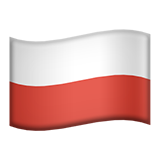 EN (PLN)
EN (PLN) EN (GBP)
EN (GBP) EN (EUR)
EN (EUR)
